Everton Independent Research Data
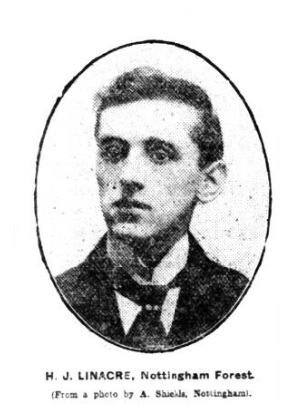
EVERTON 0 NOTTS FOREST 2
November 2, 1903. The Liverpool Mercury
For the first time this season unfavourable weather attended the home match of the Everton club on Saturday. The outlook was always dull and at times drizzle set in. In view of the fine victory at Blackburn on the previous Saturday, it was confidently expected that Everton would retain their unbeaten home record, notwithstanding the good form shown by the Foresters in their away matches. The teams were at full strength, and faced as follows : - Everton: - Kitchen, goal, W. Balmer, and Crelly backs, Wolstenholme Booth (captain), and Abbott half-backs, Sharp, McDermott, Young Settle and Hardman, forwards. Notts Forest: - Linacre, goal, Craig, and Iremonger, backs, Timmins, Warren, and Norris half-backs, Davies, Sheraman, Sugden, Morren, and Spouncer, forwards. Referee Fred Kirkham Everton won the toss and thus gained the advantage of the wind. Sugden started in the presence of 12,000 spectators, and the early movements favoured the home side. Abbott and Booth put in some pretty touches, with the result that Hardman centred, and owing to weak kicking by the Forest backs, Settle had an opening, but sent too high. Notts forwards tried to make headway, but the Everton halves broke their combination, and Everton were again attacking on the right. A corner was forced, but from this Wolstenholme placed behind. A tussle between Sharp and Iremonger was interesting, and the latter was penalised by the referee, but the free kick brought no advantage to Everton. Both teams were exerting themselves to the utmost, and the ball rapidly travelled from end to end without either goalkeeper being seriously troubled. At last, however Sharp earned a round of applause by his cleverness in outwitting Iremonger, and his shot was punched out by Linacre, Wolsteholme afterwards obtained possession and sending at lighting speed over the cross bar. The visiting left wing became prominent, and just as Spouncer looked to have a great chance, he ran the ball over the line. Settle was penalised for tripping Morris, but the free kick, though taken from a good position was badly utilised. Abbott had the better of the tussle with Davies, and a moment later from the latter's centre Crelly miskicked, but unfortunately for Everton Sugden failed to turn the opportunity to account. After this a vigorous onslaught was maintain by the home forwards, the outside men displaying considerable smartness. The Forest defence, however, was on the alert, and Linacre was not troubled. At the other end Davies when nicely placed shot amongst the spectators, and then following a free kick, McDermott planted the ball high over the bar. Following a further vigorous attack by Everton, Booth sent in a low, fast shot which, Craig intercepted at the expense of a corner. This led to some exciting incidents in the Forest goalmouth, and Craig effected a fine save just as Young was about to fasten on the ball a few yards from the goal. The Everton quintette moved along in a style suggestive of a goal, but Hardman's centre went abegging. When hard pressed, Craig did not hesitate to kick out, and altogether defended splendidly. From a hugh kick by Balmer, Iremonger came to the rescue of his side just in time, while Linacre saved at the post a terrific shot from Wolstenholme. The Forest changed the venue, and again Sugden was at fault, otherwise Everton goal must have been captured. The visiting forwards passed prettily in midfield, but like Everton, their shooting was feeble. Shearman being a sinner in this respect. Kitchen saved from Spouncer, and Everton seemed to have a chance of forging ahead, but for once Young was apparently out of form. Hardman was conspicuous, with clever play, and he presented a grand opening to McDermott who, when beautifully placed, failed miserably to obtain the first goal. A moment later Booth was applauded for a splendid shot, which failed to take effect. Towards the interval, Everton pressed, but as in the earlier stages, their shooting left much to be desired, and at half-time there was no score. The second half opened with a vigorous onslaught by the Evertonians, but again their shooting powers were at fault. A corner was placed behind, and then Spouncer called upon both Balmer and Booth. Hardman careered merrily along the wing, and from his centre Young sent wide of the upright. Suddenly the Forest dashed away, led by Sugden, who crossed to Davies. The latter shot in, and Kitchen in clearing fell down, Shearman dashing up with no one in front of him, and drew first blood for the Forest. This seemed to inspire the Lacemen, and for a few minutes the Everton defence was subjected to severe pressure. Gradually Everton responded to the cries of their supporters. Sharp centred grandly and Settle had only to tip the ball through to equalize, but to the great disappointment of the spectators he feebly banged the ball against Linacre, from whom it rebounded out of danger. It was a glorious opportunity absolutely thrown away. Forest quite held their own, and on two or three occasions, Kitchen agility alone averted further disaster. Everton were quite unable to reproduce their previous home form, and there was nothing like the usual understanding between the forwards and the half-backs line. Rain was now falling, and the conditions were pretty dismal, especially for the disappointed supporters. Mainly through poor shooting Everton failed to draw level. Just before the finish Sugden scored a second goal for Forest, and Everton sustained their first home defeat of the season by two goals to nil.
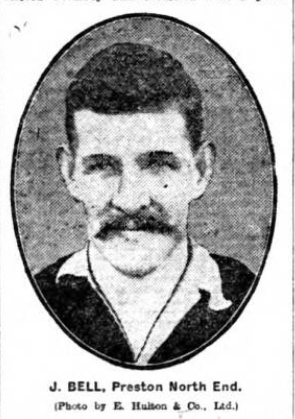
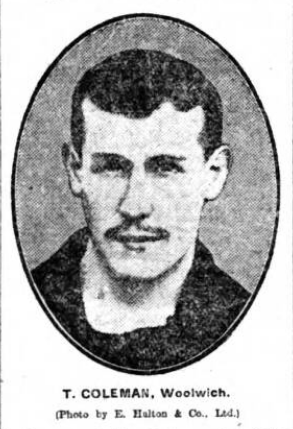
Ex and Future Evertonians Jack Bell and Tim Coleman
COLNE 0 EVERTON RESERVES 3
November 2, 1903. The Liverpool Mercury
Lancashire Combination “A” Division. (Game 7)
At Colne, before 4,000 spectators. At half time the score read Everton 1 goal, Colne nil. On the resumption play was extremely keen, but Everton at length increased their lead. Clone played a good game throughout, but eventually had to succumb to Everton who were maters of the situation, and won by three goals to nil. Everton: - Whitley, goal, Gordon and Murray, backs, Taylor, Chadwick, and Makepeace half-backs, Rankin, Sheridan, Corrin, Dilly, and Simpson forwards.
EVERTON REVIEW
November 2, 1903. The Liverpool Mercury
Prior to Saturday Everton had given such capital exhibitions of football at Goodison park that their supporters had begun to consider them invincible on their own ground, and few were there who would have ventured to prognosticate that their first reverse on this enclosure would be inflicted upon them by Nottingham Forest. After the defeat sustained by the Midlanders a week ago at the hands of Small Heath, such an anticipation could scarcely have entered the mind of everyone conversant with football form, but the isolated individual who always fixes his vaticination on the basis of the unlucky happening must have fairly showed himself in the match under notice. Everton's defeat b two clear goals was surprising. Chiefly on account of the quarter from which the reverse was inflicted, and had it come from what are usually considered the dangerous teams in the League, the astonishment would not have been so pronounced. The ostensible cause of the downfall of Everton was clear to all who saw the match, but what the various subsidiary items were each exercising in influence on the individual which culminated in two of the Everton forwards exhibiting most incompetent footwork is more difficult to fashion. Young and McDermott infused the leaven of inefficiency into the fears, and though the rest of the side strove desperately to resist the influence they had to ackownledge its permeating powers at the finish, and there was the astonishing spectacle witnessed of the backs miskicking, and the custodian giving away a goal before the close of the game. The play merits but little attention, and simply resolved itself into the fact that the visitors scored twice, and that Everton by their ineffecticiency near goal, conveyed the idea that they would never have gained a point had they been yet playing. Sharp sent across some perfect centres, but all met with the same fate. The two forwards already mentioned missed at least half a dozen easy chances of opening the score, but the biggest blunder of all was when Settle received the ball from Sharp, who had Striven valiantly to prevent the leather going out of play. The inside left was utterly unmarked, with Linacre only to beat, and not more than five yards away from goal, but, like an intelligent (?) workman, he shot straight at the custodian, though for what reason it is difficult to say. A judicious tap would have brought a goal, but the unreasonable cannon drive straight at his keeper was simply a shear waste of energy. A part from this, Everton should have won the match in the first half, and they were so clearly the superior side, that trifling details such as the acquisition of goals were utterly discarded, probably on the assumption that they could be got a little later on, when the dallying and finessing had been given a fair chance, and the spectators had become satisfied with watching the ball flying over, or on, to the covered stands behind the goals. The Notts players fully appreciated the situation, and, as Everton wouldn't, or couldn't score, they look upon themselves the task of goal gettings, and after they had once been successful-this occurring about ten minutes after the interval-they began to Beat Everton in their midfield play, and when Settle bungled a perfect opening gained by Sharp, to which, allusion has already been made they romped home easily. Their second goal, a minute from time, was a grit, and made the defeat appear a respectable one. Sugden and Shearman were the scorers for the Foresters, but a limited space prevents the mention of the non-scorers for Everton. The sole cause of Everton's defeat was the utter inability of the three inside forwards to utilise the numberless chances, which were made for them. In addition, three players, instead of making tracks for goal when in possession, were too inclined to indulge in useless passing and re-passing, tracing intricate patterns on the greenward, pretty to view but absolutely ineffective for the securing of goals. Young was utterly unable to do anything right, he was suffering from one of those attacks, which occasionally come to most players, namely, of doing the wrong thing always at the right time. The bulk of his passes went straight to one or other of the visiting backs, and the extreme wingers received no assistance whatever from him. McDermott caught the infection badly, and the pair furnished an object lesson in the art of how not to score. Their form was too bad to be true, which may perhaps form food for a series of pleasant relections, and temper disappointment. Settle accomplished some clever work in midfield, and it was unfortunate that he should have blundered so badly with that one opening, than which no easily could have been given. Sharp was the best forwards on the field, and it, is to be regretted that his partner was in such an impotent humour, for the extreme winger, whenever he did get the ball invariably made the most of the chance afforded. Hardman played a good game, but every movement was rendered futile by the inaccuracy-to use a mild term-of the finishing touches of the inside man. The halves were the best repressed by Booth, but no fault could be found with any of the trio until about 15 minutes from the finish, when matters underwent a change, due no doubt to the patent weakness of the forwards already mentioned. Balmer was the better of the backs, Crelly being a bit of colour in his general play, and Kitchen was equal to everything that came his way except the shot which he apparently misjudged at the finish, and which converted into a goal. He however, did not always clear with that precision, which is usually seen, though he only blundered once. The Foresters did not play a great game by any means, and before the interval they were fortunate in not being left badly in the rear. The best part of the side was the rare division, for the full backs kicked sturdily and vigorously and were not very particular as the exact location of the return so long as they succeeded in clearing their lines. The shining light at half-back was Timmins, who was equally as efficient in defensive tactics as in initiating aggressive movements, but the other two were average plodders who satisfactory preformed their duty. The forwards were no better than those of the home side in fact, they were decidedly inferior in midfield work, and the only reason they cannot be dubbed as the feebler set near goal is because the home front rank descended to a level below, which was impossible to fall. Davies seems a speedy sort of forward, and he was the most prominent of an ordinary line, though Spencer shaped well occasionally, but the remainder were only moderate. Everton as a matter of fact, lost the game themselves they were not vanquished by a better side, they were overthrown solely by their own incompetence near goal, and the result of the defeat be to demonstrate to them the necessity of shooting hard and often, and with some idea of the loostily of the netting, the unpalatable lesson will not have been caught in vein.
EVERTON EXTINGUISHED BY TWO GOALS
Athletic News - Monday 02 November 1903
By Tityrus
Liverpool has often proved a happy hunting ground for the Nottingham visitors, and once more Saturday did the luck assist the Foresters against Everton. Despite a disagreeable drizzle some 18,000 people foregathered at Goodison Park, but the vast majority must have departed feeling that their own team had not done justice to their undoubted powers.
TWO GOALS FOR THE REDS
In the first “forty-five” Everton were the more aggressive, but they neglected chances too numerous to mention. Changing ends we soon saw the first goal. This came in four minutes; Sudgen initiated an attack by neatly passing to Davies on the right wing. The ex-Swindonian rushed along, and his comrades lined up with him. Kitchen partly repelled Davies’s capital centre, but only to the foot of Shearman, who netted as he fell on the grass. The Forest were evidently bent on keeping this advantage, but once Settle ought to have equalized, as he found himself within six yards of Linacre and had the greater portion of the goal at his mercy. Yet Linacre mesmerized his opponent, who fisted away. The Reds believed that the best defence was to harass Everton, and this they did, another fine centre by Davies being well headed in by Morris, but Kitchen maintained his good name-although he made a woeful mistake a minute before the close, when Spouncer made a haphazard kick into goal. Kitchen was slow, with the result that Sugden bore down upon him, and easily scored. Thus the visitors prevailed by 2-0.
A STORY OF LOST OPPORTUNTIES
Remembering what Everton have accomplished during this season, their classic display against Newcastle United, and their exhibition against Bury, I confess that I anticipated that they would be the victors. Particularly was I urged to this conclusion by the utter unreliability of the Foresters, who one day are equal to thrashing Sunderland and the next allow themselves to be conquered by Small heath. Whatever the Forest team may be, they are not faint-hearted. Before the game their officials declared that the stronger the combination they had to tackle the more resolutely they put their shoulders to the work. This, of course, was intended to ne metaphorical, and must not be taken literally in any sense. And there is no escaping from the fact that on Saturday the Reds battled for all they were worth. This proved to be two goals in a struggle which was grim rather than graceful, determined rather than dexterous, and sustained rather than scientific. Indeed, looking at the reputation and the traditions of the rivals I expected much of the finer art of football-and as I saw little, I was by so much disappointed. Naturally the Foresters were delighted with a victory, which was an improvement on the drawn game of last season, and equally, of course, Everton were cast down. At the same time, as I saw the play, the Evertonians beat themselves in a large measure by their extraordinary ineptitude in front of goal. During the first half their forwards had at least half a dozen positions which would have been splendid coigns of vantage to capable marksmen. The chances that were neglected were like the “hands” of the Heaten Chinee “quite frightful to see.” Centres went a-begging, and Everton went empty away. There was an indecision which was fatal. The first half was a story of lost opportunities for both teams,. Particularly for Everton, who ought to have reversed with a substantial credit note. The Foresters, too, were at fault, but, although they had a share of the play, they never had the game in their hands like Everton.
THE TRANSFORMATION
But on changing ends the Reds speedily led by a goal, which had been really cleverly worked for by Davies, and from that point they seemed a winning team. They met a resolute and often clever defence, but even when Everton rallied the want to resource by the inside forwards proved the undoing of the home team. The longer they played the better the Foresters acquitted themselves, although the final goal was purely a gift. But the match had long since been won, and this point was a mere incident, for one goal was, under the circumstances, quite as effective as a dozen. The Foresters were undoubtedly the more skillful eleven, although their display was not to me convincing up to the point of their being a really fine team. I wish I could say more in their favour, for I still think that Everton contributed to their own downfall by their feeble and faulty footwork when in front of Linacre.
ANENT THE FORESTERS
It is the first time that I have seen the Forest during this season, and I must say that whenever their attacking five happened to fall into their stride and their swing they swept down the enclosure in a style which invariably boded danger. They showed speed and spirit, and, considering that they were indifferently served in the centre, were far more effective than at times seemed probable. Sugden, I am told, has not played his game since the Sunderland match, and he was so much below par on Saturday that there was a grave doubt as to the wisdom of playing him up to the last half hour, and, therefore, it would be unkind to say more than that he was seldom in one’s eye. The old firm of Spouncer and Morris are still a power, but both wandered and both were guilty of dribbling across the field to the right wing instead of making a long pass and rushing on for the return. These kind of dribbles serve no purpose beyond frittering time away when one’s side has the lead, and that is not sportsmanlike. Naturally Morris is slower but still clever, while Spouncer tries all the time, and finishes his dribbles by more accurate and more taking centres than formerly, in the sense that they allow those who have closed into goal the opportunity of gaining possession. Shearman will develop, but Davies struck me as the forward with the greatest possibilities. Unfortunately Mother Nature has not been too lavish in her gifts to him, but for a small, if sturdily-built, man he has some pace, and is already a really useful outside right. Taking the game all through, Timmons was the most effective half-back. I have never seen him show such perseverance, and he had to be ever on the track of Hardman. But Timmins proved both a terrier and a retriever, while in the last half-hour Warren showed finer grit than at any time. The Forest should play Warren regularly. Most followers of the game will be surprised to learn that Craig played a far superior game to Iremonger, on whom the cares of captaincy do not sit lightly. Craig’s clearances in difficult situations, with forwards hustling and busting him, were to my mind one of the matures of the match after he had recovered from a partial failure in the first few minutes. Iremonger was far too prone to kick out, and he did not place like his partner.
EVERTON OUT OF GEAR
Everton have never been seen to such disadvantage this season, and the only division which maintained form was the half-back line. All three played well, and if Settle had not stepped in when he was off-side and spoiled Abbott’s effort, it is quite possible that the latter would have made the record one goal each early in the second half. The best shots came from the half-backs, but that might easily have been the case, the only forward who distinguished himself was Hardman, who time and again played up dashing dribbles by centres – and fine centres, too-right off the line, with his tangle-footed, for he either got in the way of the other or over-ran the ball, while his passes out to the wings. Sharp, who has been playing well this season, suffered from the poor passes made to him- but even when he might have been expected to assert himself he was indifferent. In fact, the whole machine was out of gear, and was likely to be with the three inside forwards so reckless in passing and so erring in shooting. Balmer, who is recovering his robustness, was a stouter and more judicious back than Crelley, while Kitchen undoubtedly gave the last goal away through his dalliance. The match should serve a useful purpose in stimulating the Forest to higher flights of football, and in teaching Everton that swift and true shooting is the most paying art in all football. Everton; Kitchen; Balmer, and Crelley; Wolstenholme, Booth, and Abbott; Sharp, McDermott, Young, Settle, and Hardman. Notthingham Forest; Linacre; Criag, and Iremonger; Timmins, Warren, and Norris; Davies, Shearman, Sugden, Morris and Spouncer. Referee; Mr. Tom Kirkham, Burslem.
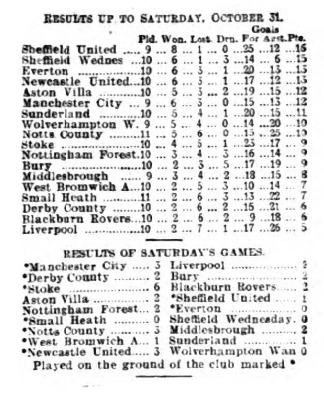
FOREST’S BRILLIANT TRIUMPH
Nottingham Guardian - Monday 02 November 1903
Once more Forest have startled most other people, if not themselves, and judging from results their peculiar mission in life seems to be to contribute to the complete mystification of form. Having done what they did a week before, it was only characteristic of them that they should have gone to the other extreme on Saturday and leapt into distinction of a totally different kind. Consistent only in their inconsistency one does not know what to expect from them next, and uncertainty, which is the spice of football, but is, nevertheless, a little wearing to the nerves, is certainly crystallised in them. However, it was the happier side of their inconsistency that was seen on Saturday, and of the two great things that were done their triumph must unquestionable rank as high as that of the Villa, for, like Sheffield United, Everton had gathered in the maximum of points, at home, Bury, the Rovers, Middlesbrough, Newcastle United, and Notts having all had the full toll levied upon them at Goodison Park. Even away, too, they had only been beaten by the present leaders and the Villa, while in no single game had they failed to raise at least one goal, their average per week being over two. In defeating them pointless, therefore, and going one better than last season, when they drew, the “Reds” may justly take some little notion to themselves. It was their first out victory of the campaign, and the first in the League, as a matter of fact, since midway through last January, when they won at Derby; and it is a little singular that it should have happened on a ground which saw them break through an even larger spell, when early in 1889 they threw Everton out of the Cup there. A hasty and superficial judgement of the game would hardly perhaps accuse Forest of deserving to win by a couple of goals. Even were it so, and a little luck had come their way, nobody would have the hardihood to suggest that it was not time. There is still a big bill of arrears to wipe off. But a just appreciation of points and the application of the simple principle of cause and effect make it abundantly clear that the honours of the game went into the proper hands.
A POLITIC MOVE.
On the face of it, Everton had the more favourable chances of scoring in a struggle that was well spilt up, so far as its general running went, between the two. But they were not nearly so favourable as they appeared to be at first sight, for in every case but one, that in which Linacre brought off a masterly save from Settle at point-blank range, the men had to shoot before they wanted to, which is rather a tribute to a keen and alert opposition than an indictment of loose marksmanship. The feature of the game, indeed, was the brilliance of the Forest defence, which successfully coped with an attack that had wreaked more damage than any other with the single exception, that of Sheffield United. The backs were powerful as usual, Craig’s dashing tactics acting as a fine foil to the more restrained method of Iremonger, while they had the help of the steadiest and most effective half-back exhibition of the season, leaving out that against Sunderland, in which Frank Forman had a hand. The task they had to undertake was no light one, for the home halves had such a perfect harmony with their forwards that the scheme of advance adopted was always difficult to meet and checkmate. However, their tenacity and grit came out to top, and the whole five with Linacre, who, if he did nothing else than save that one shot from Settle, fully atoned for his slip against Small heath, are entitled to the highest praise. To Timmins must go the credit of the finest individual performance of the game, and it is doubtful if he has ever reached so exalted a standard. He had a clever wing to deal with, but generally had it in hand, and his headwork in particular was exceptionally telling. Warren, too, well served by his height, accomplished a lot of extremely good work, and the line as a whole was a great improvement on what the side has known in most cases. The attack, moreover, benefited considerably by forsaking the too cramped and concentrated style that has characterised it for some time past, and going in for a more open, swinging method of advance. The change, in its unfamiliarity, did not always make for prettiness or a complete understanding, but it distributed the work better and imparted a life and zip to the movements which have lately been wanting, beside giving the inside men more room in which to manoeuvre. The alteration is unquestionably one of good policy, and when it is more developed should suit the men well. The result of the contest was an ugly surprise to Everton, but on the day’s form they were certainly beaten by a more adaptive and nipper side.
THE HOME OF THE “QUEENS”
Athletic News - Monday 02 November 1903
A company of pressman specially invited by the Queen’s Park F.C. Executive last week viewed the magnificent new enclosure which the famous old club has built for itself among the hills of Mount Florida. I (write our oldest contributor, “Jonathan Oldbuck”) was of the party, and gazing on the enormous expanse of field and terracing, with the grand stands (as yet incompleted) rearing themselves skywards, I could not prevent some pictures of the past forming themselves in my mind. It does not seem like thirty years since we followed the fortunes of the noted black and white brigade on the modest enclosure which was their first home. How primitive were the appointments viewed in the light this newest Hampden, yet how suitable to the requirements of the time. The Fourth Estate had then none of the comforts afforded nowadays at any first-class football ground—indeed. I rather feel that the sporting scribe at that period was more tolerated than welcomed. Spectators and players stood on the same level, and a single rope did duty as the line of demarcation between the field of action and the shouting hordes. Note-book and pencil in hand the diligent reporter followed the play up and down the touch-line, often compelled to suffer a storm of serious and witty anathemas from the spectators behind. The playing pitch at New Hampden is a picture of level pasture: on that oldest Hampden the grass was also green, but there were ridges and furrows between the goals, which played divers tricks with well-intentioned touches at the ball. Yet the players thought it first-class. It was on this historic ground that the London Wanderers played their first and only match in Scotland, and three, if not more, of the Queen’s team (C. Campbell, T. Highet, and H. McNeil) were conspicuous in Saturday’s ceremonial. In October, 1894 Queen’s Park entered second Hampden, of the classic slope, and now, after 18 years’ occupancy, they leave it for what is intended to be their home for all time. May their light never grow less. Of course, the enclosure is not yet quite equipped, as shown in our picture, for the pavilion between the stands has yet to be built. That, however, is a detail which time will conquer.
Good Wishes from Distinguished Englishmen.
For the opening function on Saturday invitations were sent to all the notabilities of the Association world. There were many acceptances, but naturally several whom the Hampden executive would have liked to tee present had by force of circumstances to decline. Lord Kinnaird regretted greatly that he could not attend. It his letter of good wishes he recalled how he had played against Queen’s Park on the day before the Tay Bridge was blown down. “It was,” says His Lordship, “one of the stormiest days I ever played on." The Queen Park club always reminded him of hard, fast games. Mr. John C. Clegg, chairman of the English Football Association, was pleased to know that the new ground was to be worthy of the club, whose players he hoped would long maintain the high standard of the game they had hitherto held. His personal recollections of some of the club's old members were among the most pleasant of his football associations. Mr. Charles Crump, vice-president of the English Association, hoped the future of the club would be even more successful than in the past. It could not be more honourable. Another vice-president, Mr. G.S. Sherrington, expressed admiration of the enterprise and determination of the club, and could only wish that English Public School and Corinthian Amateurs would show something of the same spirit, Interesting incidents were recalled by Mr. C. W. Alcock, of whose illness footballers in Scotland have been deeply sorry to hear. No one, he wrote, could have a more sincere admiration for the Q.P than he. He recalled how he captained the Wanderers against the Queen’s on their first visit to London, and among quite his most pleasant recollections of the football he played were those in connection with the Q.P, and the stalwarts who represented them in those dear old times. I can assure these gentlemen that their good wishes are highly treasured by those who at present steer the old ship, and they will be put away in the locker to be handed down as valuable heirlooms.
THE OPENING FUNCTION
All that was wanted to lend éclat to the spectacle on Saturday was a little sunshine. But apart from that the weather conditions were all that could be desired, and more than was expected in view of the torrential rains we have had in Glasgow for months past. There was a very representative gathering in the private enclosure, and there was a display of fashion which one rarely meets with at an Association ground. As a matter of fact, I thought, for the time being, I was at Inverieith, the official ground of the Rugby Union, which on state occasions, is always a scene of youth and beauty. Sir John Ure Primrose, Bart, and his good lady were the central figures in what for all time should be a very historic fixture. Prior to the match there was some speech-making, all of which was good and to the point. Mr. Dalziel, the president, introduced the Lord Provost in an interesting speech, which among other things, recalled the fact that Charles Campbell, who was present, and whose name was received with cheers, represented the past and the present, and whose interest in the club is as keen and as sincerer as it was 30 years ago. Of course, Sir John made a very eloquent speech, in which he congratulated the Queen’s on the very honourable part they had played in the development of the game, and he specially emphasised the tenacity with which they had stuck to amateurism. Football, he said had become the national game of the kingdom, and he was thankful it had done so, because there was an outcry for recreation, and to his lordship there was no more delightful sight than to witness an exhibition of manly skill, strength, and endurance. Thereafter Mr. Arthur Geake, whose loyalty top the Queen’s is almost a religion, presented Sir John with a massive silver cigar case in commemoration of the occasion. It was a delightful little ceremony without a single hitch, and the cheering that the hoisting of the flag called forth was almost as spontaneous as that which welcomed the team at the end of as strenuous a contest as I have had the pleasure of witnessing for a long time. It was indeed a memorable day in the records of Scottish football. suffice it to say that the opening of New Hampden will be a theme of delightful conversation for many a day to come.

SATURDAY FOOTBALL
Liverpool Daily Post - Monday 02 November 1903
It never rains till it pours. No one expected that Everton would keep their undefeated home intact, but their downfall before Notts Forest was a big surprise. Soon after the start it was quite evident they were not in that confident and buoyant form which has previously characterised their efforts at Goodison Park. In front of goal their shooting was half-hearted, and their combination and passing was never of a high order, and particularly when completing a movement was there an absence of decision and method. Neither Balmer nor Crelly gave a creditable exhibition, but both the Forest backs in comparison were much more nimble and alert, and rescued Linacre many a time and oft from jeopardy. The Notts forwards, when once they wanted to their work, went about it in a thoroughly businesslike manner, centreing smartly and cleverly, and cutting no time to waste. The game might easily have ended similarly (a draw) to the corresponding one of last season had Kitchen been in his best form, but he seemed to share the supineness of his colleagues, and was twice beaten under circumstances which usually would cause him little trouble. It is to be hoped that the reverse will stimulate the Blues to greater efforts, and not mark a falling-off in the very creditable form they have heretofore displayed. They will have to show a big improvement if they intend lowering Wednesday’s colours at Sheffield next Saturday.
EVERTON v NOTTS FOREST
Liverpool Mercury - Monday 02 November 1903
This match was played at Goodison Park in dull weather, before 12,000 spectators. Everton were aggressive early on; but afterwards the Forest attacked, Sugden twice missing capital centres from Davies. Hardman got away, but his centre was badly utilised, and further efforts by the Everton forwards were spoilt by feeble shooting. Another centre from Hardman was thrown away. McDermott shooting wretchedly. Half-time -Everton nil, Forest, nil.
In the second half Everton attacked without success. Then, following a run by Sugden, Kitchen fell in saving from Davies, and Shearman opened the score for Forest. The game was spiritedly contested, and from Sharp’s centre, Settle missed a grand chance of equalising. The Forest held their own, especially in view of the feeble shooting by the Everton forwards. Sugden scored just on time.
Result Nottingham Forest 2 Everton 0
Everton.- Kitchen, goal; Balmer and Crelly, backs; Wolstenholme, Booth (Captain), and Abbott, half-backs; Sharp, McDermott, Young, Settle, and Hardman, forwards.
Notts Forest.- Linacre, goal; Craig and Iremonger, backs; Timmins, Warren, and Norris, half-backs; Davies, Shearman, Sugden, Morris, and Spouncer, forwards.
EVERTON COLOURS
Northern Daily Telegraph - Tuesday 03 November 1903
A Liverpool correspondent to a contemporary points out in connection with the Rovers’ change of colours against Everton that on September 1 Everton played the Rovers at Goodison, and both teams entered the arena in their accustomed colours. The similarity was most marked. Everton’s passing was poor, hence the Rovers were leading at half-time by 1-0. Prior to the second moiety Everton changed their colours, and won handsomely by 3 goals to 1.
GOODISONIANS TOO GOOD AT GOAL GETTING
Burnley Express - Wednesday 04 November 1903
There was a capital attendance of spectators at Colne on Saturday, when the premier team bad as antagonists the Everton Reserve team. The home eleven included two new players Seddon, outside left, and Talbot, outside right, whilst relied upon tbe same team that did duty the previous week. Teams Maybury, Smatley, Turner, Golding, Walker, Pounder, Talbot, Savage, Sawley, Driver, and Sneddon. Everton: Whiteley, Gordon, Murray, Taylor, Chadwick, Makepeace, Rankin, Sheridan, Corrin, Dilly, and Simpson. Though Everton started, the home side were first to take up the running and Murray was called upon twice to clear. A long shot from Savage tested Whiteley, and after this Furrier had to repulse the visitors, who threatened the home goal. After passing through anxious time, Colne again brought pressure to bear on Whiteley's charge. Sawley sent in a grand shot, which Whiteley had some difficulty clearing. Driver next sent the ball over tbe bar. Maybury was next tested, successfully negotiated Diliy's shot. Colne more than held their own up to the interval, when the score sheet was blank. Shortly alter the re-start the Everton right wing rushed down the field and Rankin centred. Turner missed his kick, and Corin promptly netted the leather. After this reverse the home team attacked vigorously and some hot scrimmaging work took place in front of the Everton goal, which, however, escaped. After lengthy period of even play Everton livened up and Corin added a second goal. Seddon sent in a shot, which was met Gordon, and the Everton left wing getting possession again, Dilly with a fast low shot completed the scoring. Everton won by three goals to nil.
TIT-BITS OF " THE" LEAGUE
Football Chat and Athletic World, Wednesday, November 4 1903
By “Montesuma”
Everton must feel doubly vexed at losing their first home points to Notts Forest, just when a victory would have taken them right on the heels of the fallen Braman brethren. But they have only themselves to blame for allowing Notts Forest to take away two points and 2 goals to nil, for they were faulty both in attack and defence. The usually reliable Kitchen might have saved both goals with a bit more effort, and the forwards in the main frittered away numerous goal-scoring openings, and really the half-backs were their most frequent shooters. Everton's front line got sadly out of gear. The men got out of their places, and played so close a game that they appeared to tumble over each other. Then they couldn't shoot for nuts. Young was weak in every sense of the word, and McDermott proved too selfish. Notts Forest improved the longer they played. Linacre effected two brilliant clearances, and Craig played well. So did Timmins at right-half, whilst I fancy Warren is their moat fit and proper person to step into Frank Forman's shoes. Davis and Shearman make a good wing, and Sugden, who scored both goals, acted like an intelligent centre. But Morris, who was injured in the second half, was by no means as busy as usual. With their first away the Foresters should now take heart of grace. I think their forwards will yet shine as goal-getters.
EVERTON RESERVES TEAM
Lancashire Evening Post - Friday 06 November 1903
Everton Reserve v Rossendale United
Everton; Whitley, goal; Gordon and Murray, backs; Taylor, Chadwick, and Makepeace, half-backs; Rankin, Sheridan, Sutherland, Corrin, and McEwan, forwards.
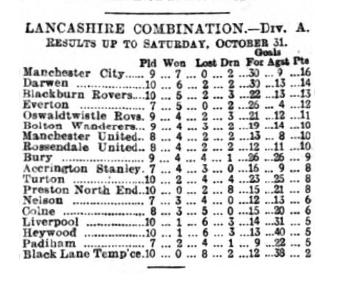
FOOTBALL.
Liverpool Evening Express - Friday 06 November 1903
Everton v. Sheffield Wednesday.
In connection with the above match to-morrow the Great Central Railway are running a fast special train, leaving Central Station at 12 15, due at Wadsley Bridge at 2 15 p.m. The station is within three minutes’ walk of the ground. The return train leaves Wadsley Bridge at 6 23, and Sheffield at 6 15.
EVERTON'S LATEST CAPTURE
Sheffield Daily Telegraph - Saturday 07 November 1903
Everton Football Club have secured William Sutherland, centre forward of Queen's Park, Glasgow.
EVERTON FOOTBALL CLUB
Saturday, November 7 1903 South London Chronicles’
Everton Village –where the toffee comes from –is very much of a rus in urban now; for Liverpool City long ago swallowed it up. But Everton's name is famous in football annuals as belonging to a team who have played well for years in the forefront of the “Soccer” game. For resolute and scientific combination the club has established a very high reputation both in League fixtures and cup ties. The Evertonian team had a humble beginning. It sprang from a little local chapel club that played in St. Domingo Vale, and the name of Everton was assumed in 1879. In 1880 the club joined the Lancashire County Association, and its members showed an abundance of pluck. At this period Great Lever was a power in County Palatine football, and when Everton was drawn against them in the Lancashire Cup Competition it was admitted that they had an arduous task to perform. Still, the Evertonians played up with such spirit and pluck that they contrived to make a draw, but in the re-play they were badly beaten. In the next season, Everton met Bolton Wanderers, only to be smashed up to the extent of 13 goals to 1 –rather a different result from those which eventuate at the meetings of the two clubs nowadays.
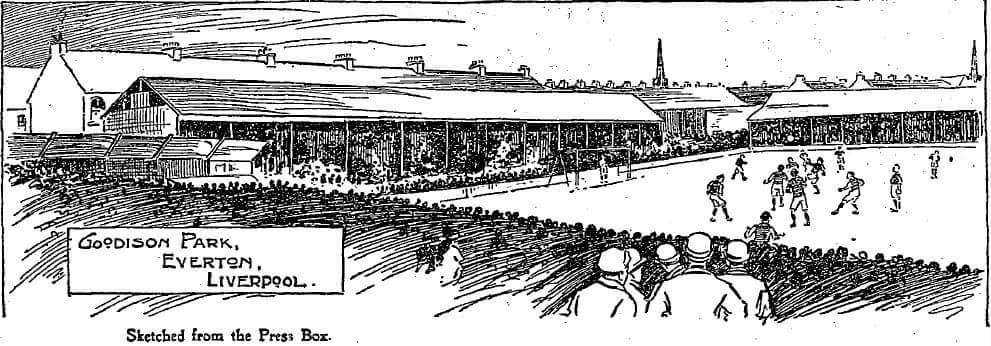
It was in 1883 that the club got its first enclosed ground, their first gate amounting to only 14s. It was in this same year that J. Trainer, one of the finest, if not the finest, goalkeeper ever seen, became a member of Everton club, playing with the second team, but he did not stay long with the Liverpudians, as he went off to Bolton, Everton thus losing an embryo international. In the year 1884 the club captured the Liverpool Association Cup, overthrowing Earlestown in the final. At a meeting between Bootle and Everton clubs in a cup tie on January 31 st, 1885, £40 was taken at the gate, which was reckoned very satisfactory at the time –there were no £1,000 gates then. But step by step the club rose in reputation, and with its football successes came increased support, and of course a swelling of the exchequer. This enabled the management to improve the club all round, and when the League started in 1888 Everton could boast of such a powerful team that they were runners up to the then invincible Preston North Ender; their points were 30 out of a possible 44, Aston Villa coming next with 29.
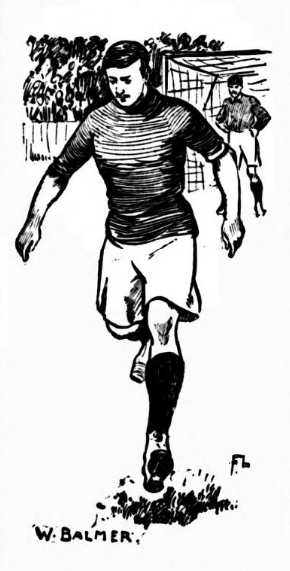
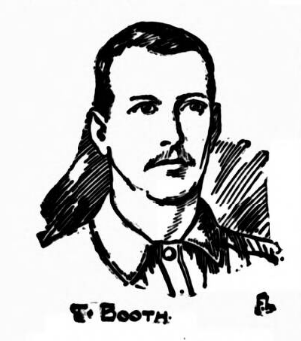
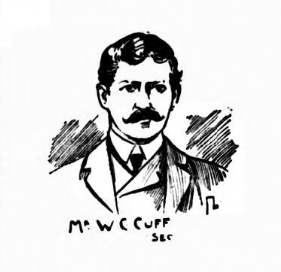
In the year following Everton ran Preston North End very close for the championship again, the “Invincible” scoring 33 points while Everton obtained 31. Blackburn Rovers were third with 27. Then came the crowning glory of the team in 1890, when Preston in their turn had to play second fiddle to the Evertonians, who occupied the proud position of League Champions. They scored 29 points against the North Enders' 27, Notts County and Wolverhampton Wanderers each obtaining 26. The members of the Everton club in 1892 formed themselves into a Limited liability company, a speculation which turned out a most gratifying success. Everton became one of the richest clubs in the League, so wealthy, indeed, that they could afford to pay away thousands of pounds per annum in players' wages alone. In 1894 Everton could not compare with Sunderland which was a grand League form; but the Villagers had been engaged hotly in another tussle, for they had run into the final of the English Cup, in which the Wolverhampton Wanderers only beat them by a single goal in an ever-to-be-remembered game, the one played at Fallowfield.
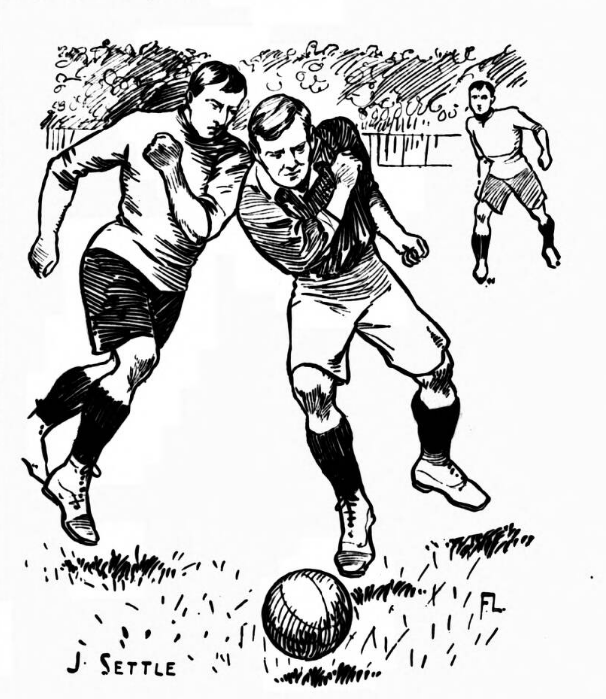
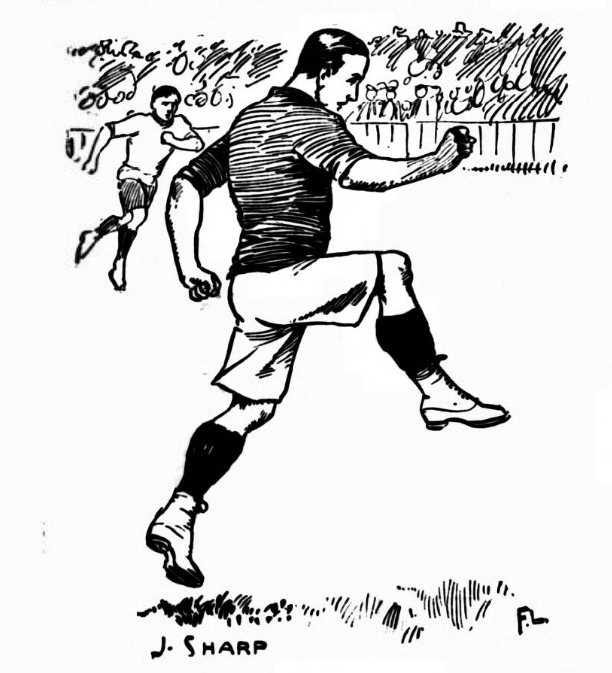
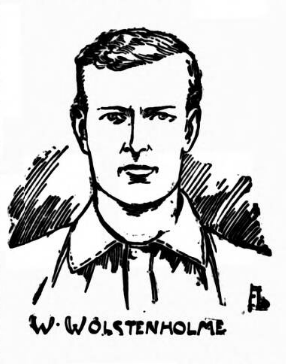
Only moderate success attended their efforts in the League in the next season, in spite of the amount of money that the directors disbursed with no niggardly hand, but in 1894-95 Everton occupied second place to Sunderland with 42 points out of a possible 60, Aston Villa being third with 39. It was about this period that the club entered into negotiations with Colonel Naylor Leyland for the acquisition of the freehold of the ground at Goodison Park, and eventually the spacious area of somewhere about 30,000 square yards was purchased for a little over £8,000. It was a good bargain, and the directors spent another £4,000 on the now celebrated enclosure, which was converted into one of the best football centres in the land. Everton made a good show in the League in 1895-96, but in the following season the club's efforts were not quite so good in the direction, for they were busy again going for the Cup, and reached the final only to be defeated at the Crystal Palace by a goal, Aston Villa being the victors. Since that date Everton have not reached the Cup final, though they have remained all along a team to be greatly feared in the League games. Everton obtained in the First Division competition in 1897-98 the same number of points as the Wolverhampton Wanderers, 35; the only two clubs above the pair being Sheffield United, who finished with 42, and Sunderland, who scored 37. In the spring of 1889 Everton again occupied fourth position to Aston Villa, Liverpool and Burnley, the respective points being 45, 43, 39 and 38. Then in 1899-1900 came a big drop in the matter of position in the League; and, although there was no danger of them ever finishing at the bottom, many of their performances were distinctly disappointing, and when the final table was made up they occupied –for them- the vey lowly place of eleventh on the list. It was a bad year's work, and one quite unworthy of Everton. The villagers picked up in the year following, but they were overpowered by their neighbours of Liverpool, who won the premier place in the League with 45 points, whereas Everton's total, was only 37. In 1901-02 Sunderland was on top in the championship tussle with 44 points, and Everton came in a good second with 41, while Newcastle United occupied third position with 37. In point of goals scoring, however, Everton were the best side in the League that season, for they, like Sunderland, had only 35 goals obtained against them, whereas they pierced their opponents' defence fifty-three times to the fifty of the champions. They had a tough fight in the Cup ties with Liverpool the same year, and it was only a drawn game that Liverpool proved the conquerors. In 1903-03 Everton did not do well in the League, being as many as ten points behind the champions, Sheffield Wednesday. To almost everyone's surprise, too, Everton succumbed in the third round of the English Cup to Millwall in London. Though naturally the present players attached to the club appear more vividly in the mind's eye than several ancient lights of the Evertonians, it is hardly possible to give even a belief survey of the club's history and doings without reference to such as John Southworth, Edgar Chadwick, and his great partner Milward, Latta, J. Bell, and speedy Fred Geary, the tricky Holt, the solid Kelso, and the famous “Nick” Ross. Since then Whitley has done good service in goal, and so has Kitchen, for the matter of that, on many occasions. Brearley, a fine Liverpool-born forward, played well for Everton after he had been with various other clubs; but he finally went to Tottenham Hotspur. Another admirable player of Mersey-side nativity is W. Balmer, the right full back. He is one of the coolest defenders in the League which he has represented against Scotland. Tom Booth can play centre of right half-back. He was born in Manchester in 1876, and began his football career in the Ashton North End team, subsequently joining Blackburn Rovers, of which club he was when he got his international cap in 1898. He is a splendid all-round exponent of the game and always reliable. He makes a most capable captain. Wolstenholmes, right half-back, was born at Little Lever in 1878. His clever tactics are always a feature of Everton's games. J. Sharp, the outside right, was born at Hereford in 1879. He is one of the best-known player both as cricket and football in the country. He made his name with Aston Villa with whom he was a portion of two seasons, and reached Goodison Park in 1899. Gained his international cap last season against Ireland, playing inside right. A great player is J. Settle, the inside left, who was born at Millom. From Bolton Wanderers Reserves he went to Halliwell Rovers in 1895, Bury securing his transfer two years later. It was while with the latter club that he got his first international cap, and he was secured by Everton at a big fee. Has played well in all three internationals, and has stuck to the “village” team in spite of many tempting offers to go elsewhere. Other players for Everton who may be mentioned are Crelly, a good back; Abbott, a useful left-half, who hails from Birmingham, and used to play for the Small Heath Club; McDermott., a clever Scottish inside right who came from the Celtic; A. Young, a centre forward who has done well in the that position with several North British clubs; and Hardman, a promising player in the forward line on the outside left position. For that place, Corrin, who has been with Portsmouth and formerly assisted Everton, has also returned to his old club when wanted. Mr. W.C. Cuff, the secretary of the Everton Club, is a model official, courteous and indefatigable, and in every sense a keen man of business. Under his aegis affairs at Shirted “Goodison Park go on swimmingly, and we expect to hear of a good many more successes falling to the share of the blue-Shirted “villagers.” In the opening match of the League tussle this season, as one anticipated the Everton team, strengthened by the inclusion of Hardman, from Blackpool, and McDermott, the Celt, proved as everyone expected, equal to defeating Blackburn Rovers at Goodison. It was a fine game, and for quite half the battle Crompton's brigade fully held its own. It was curious somewhat that Bowman, the Toffee's' centre forward transferred man, should open the scoring against his old love. But Sharp equalised on the stoke of half-time, and for the succeeding “45” the Everton boys went hot and strong, this being plain evidence of their fine condition. Still, time was travelling on a pace before they got their heads in front. This goal ranks as possibly the finest ever scored on the ground, and Jack Sharp was the executants. Single-handed he took the ball through all opposing for a distance three-quarters the length of the field. Then Young scored a third on the stroke of time, and Everton thus succeeded in almost reversing last season's figures. The shining lights for the winners were Balmer, Booth, Sharp, and Hardman. Since the opening match Everton have played well, and as we write hold a very good position in the League table.
CAPTURE BY EVERTON
Liverpool Daily Post - Saturday 07 November 1903
Everton have made an important capture in the person of William Deans Sutherland, a young fellow of 11st weight and 5ft 8in, in height, who has been playing as centre forward for Queen’s Park. Sutherland has come to reside in Liverpool, and has decided to throw in his lot with Everton, for whom he will turn out against Rossendale at Goodison Park this afternoon.
TODAY’S TEAM NEWS
Everton v Sheffield Wednesday
League match at Sheffield; kick-off at 3; train leaves Central Station at 11.5.
Everton.- Kitchen, goal; Balmer and Crelly, backs; Wolstenholme, Booth, and Abbott, half-backs; Sharp, McDermott, Young, Settle, and Hardman, forwards.
Everton Combination v Rossendale United.
Lancashire Combination match at Goodison Park; 3.
Everton.- Whitley, goal; Gordon and Murray, backs; Taylor, Chadwick, and Makepeace, half backs; Rankin, Sheridan, Sutherland, Corrin, and McEwan, forwards.
NEW PLAYER FOR EVERTON
Liverpool Mercury - Saturday 07 November 1903
Yesterday, the Everton Club signed on a new player- william Dean Sutherland, late centre forward of the Queen’s Park Club. Sutherland having come to reside in Liverpool, has decided to throw in his lot with the Everton Club, and will make his first appearance at Goodison Park this afternoon, in a match against Rossendale. He is a sturdily-built man, 5ft. 8in. in height, and weighs 11st., and comes with the reputation of being one of the smartest Scottish centres.

THE FOOTBALL ASSOCIATION
Liverpool Mercury - Saturday 07 November 1903
At the council meeting of the Football Association, on Monday, a letter will be considered from the Union des Sociétés Francais de Sports Athletiques, proposing that there should be a federation of the European football associations, and further inviting the F.A., to send a representative amateur team to take part in the championship competition in France on May 20, 1904, and three following days. It is proposed to delete regulation 2 of minute 23, passed Nov 10, 1902, dealing with foreign tours, which modifies the rule whereby the association sanctions or refuses clubs or teams to arrange matches with foreign clubs or teams. At the same meeting the ground for the final tie of the DF.A Challenge Cup will be decided upon.
EVERTON v. SHEFFIELD WEDNESDAY
The Liverpool Football Echo- Saturday, November 7 1903
After the recent visitation of fog, it was a positive relief to see the country smiling this morning under the kindly influence of the sun. the Everton team were due at Sheffield this afternoon, and the journey to the cutlery capital was made under the pleasantest climatic conditions. In Sheffield itself there was just a suggestion of mist, but otherwise the weather was perfectly autumnal. Crelly, the left full back reported himself ill this morning, and as a consequence his place was taken by Murray, who has performed very creditably in the reserve team. The game attracted considerable interest, and there was a large crowd present at Owlerton when the teams lined out as follow;-
Everton.- Kitchen, goal; Balmer, and Murray, backs; Wolstenholme, Booth (Captain), and Abbott, half-backs; Sharp, McDonald, McDermott, Young, Settle, and Hardman, forwards.

A KEEN STRUGGLE AT OWLERTON.
Athletic News - Monday 09 November 1903
By Nemo
Sheffield Wednesday had a lot of trouble in beating Everton at Owlerton, but they just succeeded in doing so, and their victory by the odd goal was just about what their efforts deserved. A very good fight did the Evertonians make, and were not beaten until the whistle had finally sounded, but they could not get the ball in the net, whereas the champions accomplished that feat once, as the result of a very smart attack, to which Chapman put the finishing touch, in the later stages of the first half. The weather was all that could be desired, and there was a capital attendance, which I should estimate at about 16,000. The Wednesday players wore black bands on their arms in memory of the late Mr. W. H. Stacey, who played football for the old club something like thirty years ago, and whose funeral was taking place while the match was being played. The side was the same as last week—that is, Barton, who is developing into a first-class full-back, again filled the place of Langley, who is still unsound. Everton made one change in the team beaten at home by Nottingham Forest last week. Murray figuring as left full-back instead Crelley.
THE ONLY GOAL.
When Everton kicked off they had a bright sun against them, but this gradually disappeared, and in the absence of wind the game was played under even conditions. A start was made two or three minutes before the advertised time, for there was a wholesome fear of fog settling over the ground later on. Fortunately the fog held off, and the crowd had a sight of a decidedly interesting game. Almost from the start the players made the pace a cracker, despite the rather soft state of the ground. Several times in the early stages the Wednesday forwards seemed certain to score, but suffered from over eagerness, and the cool, resolute defence of the visitors held them at bay. Later the Everton vanguard did some smart determined work, and the Wednesday half-backs had all their work cut out to hold them. It wanted seven minutes to the interval when the Sheffielders obtained what proved to the only goal of the match. This came as the result of a well sustained attack, in which most of the half-backs and forwards had a share, and ended in Chapman pouncing on the ball as it was well swung into the centre by Simpson and beating Kitchen.
AND AFTERWARDS.
Everton made a desperate effort to equalize, but at half-time Wednesday still held their lead. For a time play in the second half was considerably slower than previously, but later on the pace quickened again, but strive as they would, neither side could store. With only one goal separating the teams, the interest, was kept to the end, and the last few minutes were full of excitement. A desperate effort by Wednesday (during which Kitchen saved excellently from Wilson) being frustrated, Everton just before the close made matters lively for the home defence with several corner kicks, and once Lyall only just managed keep the ball out.
A REVIEW.
It was a good and interesting game without being exactly brilliant. What struck me most was the plucky, powerful, and skillful defence maintained by both sides. So resolute and safe were Balmer and Murray at one end, and Layton and Burton at the other, that neither custodian had a busy time, though both Lyall and Kitchen made several distinctly clever saves during the course of the game. Both sets of half-backs also played excellently, and as a consequence, the opposing forwards were rarely able to make a masterly movement of combination. As usual, Crawshaw was a prominent figure, and Booth, on the other side, did much sterling work, though, indeed, it seemed to me that among the whole half-dozen there was not much to choose. Both sets of forwards worked with energy and determination. Everton were perhaps better in combination, but Wednesday had it in “go.” I should say that the Sheffield front rank gave the opposing defence more work than the visitors forced upon the home rearguard, but the Evertonian attacks though not so numerous, were fully as dangerous, and Lyall had at least as much work to do as Kitchen. Taking the game as a whole the one goal by which the “Blades “ won was just about a fair indication of the slight superiority which they displayed in hard fought contest. Sheffield Wednesday; Lyall; Layton and Burton; Ferrier, Crawshaw, and Ruddlesdin, Davis, Chapman, Wilson, Malloch, and Simpson. Everton; Kitchen; Balmer, and Murray; Wolstenholme, Booth, and Abbott; Sharp, McDermott, Young, Settle, and Hardman. Referee; Mr. J.W. Bailey, Leicester.
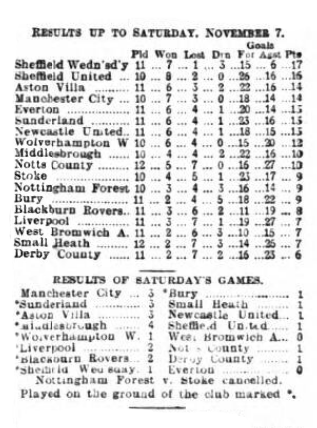
SHEFFIELD WEDNESDAY V. EVERTON
London Daily News - Monday 09 November 1903
Both these clubs having done well this season, their meeting at Sheffield was regarded with considerable interest, and 15,000 people turned up to watch the play. Everton were represented by Murray at back instead of Crelly. The game opened with some fast and exciting footbal, a fine shot from Davis being cleverly saved by Kitchen. Everton forced a corner, but Lyall brilliantly stopped the shot which followed. Even and interesting play ensued, and about seven minutes from the interval assumed a very animated character. Perhaps the over leading by a goal. The second half produced some tame play in its early stages, but subsequently the game once more assumer a very animated character. Perhaps the Wednesday had the most of the play, but there was little to choose between the teams. Nothing further being scored, Sheffield Wednesday won by one goal to nil. They are now at the head of the League. With one more game played they are a point in front of the other Sheffield club, the United.
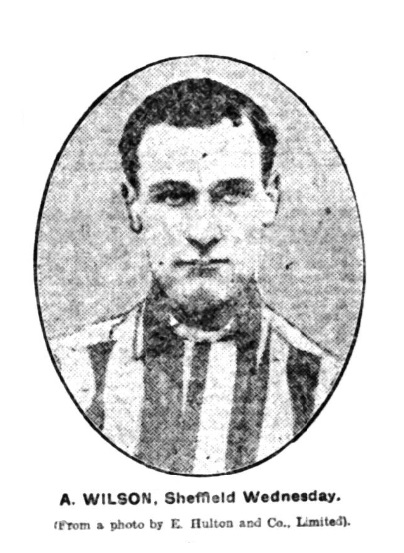
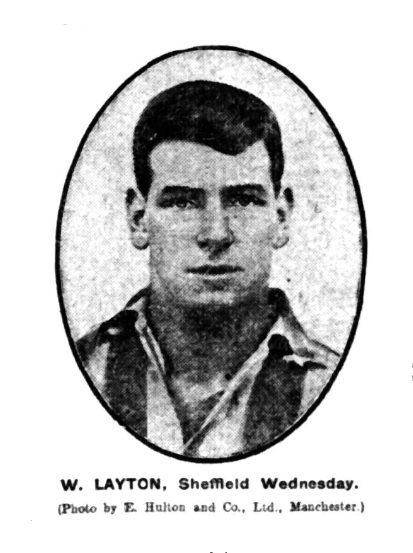
SHEFFIELD WEDNESDAY 1 EVERTON 0
November 9, 1903. The Liverpool Courier
The Blades were at home to Everton on Saturday, and the weather was beautifully fine. Both sides were without one of their fullbacks, Murray taking Crelly's place owing to the latter's illness, while Everton appeared in the Wednesday team vice Langley. There was a big attendance when the teams turned out as follows: - Sheffield Wednesday: - Lyall, goal, Layton and Barton backs, Ferrier, Crawshaw, and Ruddlesdin, half-backs, Davis, Chapman, Wilson, Malloch, and Simpson, forwards. Everton: - Kitchen goal, W.Balmer, and Murray, backs, Wolstenholme, Booth (captain), and Abbott half-backs, Sharp, McDermott, Young Settle, and Hardman, forwards. Referee J.W.Bailey. Everton kicked off, facing the sun. The opposing stages were contested about midfield, when Simpson, fastening on the ball, raced away, and but for hesitancy at the crucial moment must have scored. Balmer stepped into the breech, and clearing strongly, a movement was made by the Everton left wing pair, only to be finally pulled up by Layton. The pace was brisk, and the general play for some few minutes was contested in fairly even fashion. A free kick to Everton found Settle in possession, but that player with Booth spoiled a possible opening by useless finessing with the ball. The Blades forwards next sent in a trio of shots, but none troubled Kitchen, as they were wide. The Wednesday forwards and halves worked in better unison than their opponents, and for some little time the game was contested within twenty yards of Kitchen, who was fortunately ably covered by his backs. Next came Everton's turn, and Lyall was called upon, but he kept his charge intact. The visitors attack was but short-lived, and following an attack by the left wing, the ball was put across to Davis, who with a swift shot, brought out a fine effort from Kitchen, who punched safely away. Then came a clever shot from Sharp, who screwed almost from the line, and a moment later had the Everton inside men been at all smart, a good goal must have accured, seeing that at the time Lyall was lying helpless on the ground. A strong run by Davis and Chapman resulted in the ball being placed to the left wing, and Wilson mulling the centre, put in a splendid shot, which just grazed the upright. A long shot from McDermott went wide of the mark, and this effort was followed by a fairly good drive from Wolstenholme, but Lyall was not to be caught napping. Play was always interesting, and so far as the Everton forwards were concerned they worked well together, and were distinctly unlucky in not finding the net. On one occasion Hardman took a sharp pass, and while at top speed shot in accurately, only to find Lyall bringing off a capital save, while Settle had the misfortunate to see a capital shot charged down. Sheffield had the better share of the game, but nothing could have been keener than the persistent attentions of the Everton half-backs who kept the Blades out repeatedly. Eventaully the Everton forwards moved down in clever fashion, and after some good work by Sharp the ball was put across to Hardman, who forced a corner, which, however, came to nothing. Within a couple of minutes the play was again at the visitors end, where Malloch and Simpson found plenty of work for Wolstenholme and Balmer. The former came under the notice of the referee on more than one occasion, and from a free kick, the ball was centred by Malloch to Chapman, who, losing no time, put the ball past Kitchen five minutes from the interval. This reverse put Everton on their mettle. They rushed down in a determined fashion, only to be met by equally stubborn defenders. Towards the interval Everton pressed, but without success. Half-time Sheffield Wednesday 1, Everton nil. On resuming play was very tamely contested for some time. Then Everton made a strong raid on the Wednesday goal, but the shooting was had. Gradually the Wednesday forwards assumed the upper hand, and the Everton backs were found plenty of work. Kitchen had to save from Malloch, and he also had to exert himself to prevent, a fine shot from Simpson taking effect. The latter stages of this half were much in favour of the home side but Balmer and Murray defended finely, and the Everton goal was not again captured. Final result Wednesday 1 Everton Nil.

.jpg)
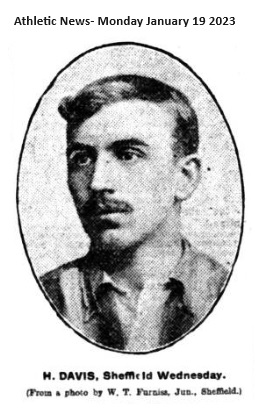
EVERTON RESERVES 2 ROSSENDALE UNITED 0
November 9, 1903. The Liverpool Mercury
Lancashire Combition “A” Division (Game 8)
At Goodison Park, Everton pressed at the outset, and Arrowsmith was frequently called upon. Sheridan scored and another was added soon afterwards. Everton leading by two goals to nil at the interval. In the second half, the Rossendale defence was impregnable, and the score remained unaltered. Everton: - Whitley goal Gordon and Murray, backs, Taylor, Chadwick, and Makepeace half-backs, Rankin, Sheridan, W.D. Sutherland, Corrin, and McEwan, forwards .
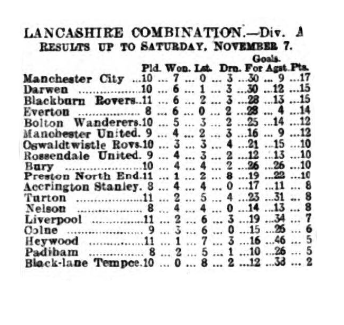
EVERTON REVIEW
November 9, 1903. The Liverpool Mercury
Everton have rarely proved successful against Sheffield Wednesday on their visits to the cutley capital, and no great surprise was occasioned by the defeat which they sustained on Saturday. They only lost by the narrowest possible margin, and, in view of their experience last season, there is some consolation in the fact, seeing that the outcome of their previous appearance at Owleton Park, was a much more singular reverse by four goals to one. Owing largely to the sticky turf, the game could not be considered by any means a high-class exposition of Association football. The fault on both side were obvious and many, but taking the general run of the play the “Blades” were entitled to their victory which, by the way, keeps them at the head of the League table. The first half was contested in spirited fashion, and for the most part on terms of equality. There were numerous pretty touches exhibited during the stage by the Evertonians, but whereas these produced nothing tangible, the Wednesday were enabled. through Chapman to obtain a solitary goal that gave them a couple of valuable points. In the second half, Everton were nothing like so conspicuous as they had been in the earlier stages of the game, though exception might be made during the last few minutes, when they put on pressure that taxed the Wednesday defenders severely. The home side however, had infinitely more chances than they of scoring, and under the circumstances the Everton defenders are entitled to credit for keeping out not a few well meant efforts. Where Everton failed was mainly owing to the lack of incisiveness of the three inside forwards. Sharp throughout did himself thorough justice, and Hardman especially in the opening half, and afterwards whenever he had a chance did all that could be expected of him in the direction of placing his side in a much more favourable position. Until the front line can combine with greater efficiency than has been the case, not only against Notts Forest, but against Sheffield Wednesday, there seems little hope that their admirable footwork in midfield will produce the all-important goal. Apart from this the Evertonians might have turned the tables on their opponents had they displayed anything like the dash and vigour of the Sheffield quintet. It was due, not so much to cleverness in attack as to be infusion of dash in their movements, that the Blades own their success. This was the more noticeable during the second half of the contest, when the home forwards lost no opportunity of keeping possession, and forging ahead and when necessity required, falling back to prevent the opposing van from getting into anything like a dangerous stride. On the other hand, the “Blues” were comparatively kept, and, but for the really capable work by the wingmen, the display of the front line must have been reduced to a very ordinary level. The half backs worked particularly hard where extreme pressure was brought to bear during the earlier stages, but it was only natural to expect that later on they should be so often overrun through the failure of the forwards to keep in possession of the ball. As suggested the Everton half-backs, under the circumstances would scarcely do themselves justice. Playing behind a forward line that is lacking in the first Principe's of attack, and in additions, having to oppose a quintet imbued with methods of go-ahead persistency is not calculated to see any half-backs line, at its best, such might fairly apply to the Everton trio. The full backs did exceptionally well, and for a first appearance in class football, Murray, who filled Crelly position, acquitted himself creditably, especially when one takes into consideration the harassing tactics adopted by the Sheffield right wingers. Kitchen kept a capital goal, and on the other side Lyall was rarely seriously troubled. The full backs, Layton and Burton, were capable defenders and the latter who was brought into the team owing to Langley's injury, gave promise of serviceable reserve strength to the Blades. The half-backs played an untiring game, and had the satisfaction of seeing their efforts supplemented in no small degree by the forwards, who stopped at nothing to keep the ball into their opponents half of the field.
EVERTON LOSE TWO AT SHEFFIELD
Liverpool Daily Post - Monday 09 November 1903
Everton’s trip to Sheffield resulted in the Goodison Park brigade dropping another brace of points. Inaccessible as is the Wednesday ground at Owlerton, a fine crowd of spectators gathered to see the game. It cannot, however, he said that the exhibition was a really good one, for the most part of it was of a rough and tumble order, and not only one or two of the players, but even a section of the crowd came under the notice of the referee on one occasion. Although there was only one goal in it, the home eleven were undoubtedly the stronger side, and a little more accuracy on the part of the forwards or a little less vigilance by Kitchen, must inevitably have shown an increase in winning margin. Sharp and Hardman were undeniably the pick of the Everton forwards, both these speedy wingers playing brilliant football, but on every occasion their centres were nullified. The half back line was as sound and reliable as ever, Wolstenholme especially playing a worrying game. All things considered, Murray made an excellent substitute for Crelly. He kicked well, and is a fearless tackler. As already indicated, Kitchen behaved admirably in goal. Throughout the game the home forwards showed splendid dash, and their half back line was quite as effective as that of their opponents, which is saying a good deal. In Langley’s absence Burton figured in the left full back position, and he and Layton made a capital defence.
SHEFFIELD WEDNESDAY v EVERTON
Liverpool Mercury - Monday 09 November 1903
At Sheffield, before 12,000 people. Each team had its usual left back away, Burton and Murray playing. In the first half play was fast and good, though neither goal was hard beset, for the first half-hour. Chapman scored five minutes later from Simpson’s centre. Then Everton went down; but Sharp missed a good chance when well in front. Half-time- Wednesday, one; Everton, nil.
In the second half Wednesday were a long way the better side, and after one opening attack their opponents seldom had a look in. still Everton’s defence stood out well, though for close on half an hour their forwards failed to get away, and only the vigilance of Kitchen, Balmer, and Murray kept the home team out. Everton attacked just on time. Result;- Sheffield Wednesday 1, Everton 0
Everton.- Kitchen, goal; Balmer and Murray, backs; Wolstenholme, Booth (Captain), and Abbott, half-backs; Sharp, McDermott, Young, Settle, and Hardman, forwards.
Sheffield.- Lyall, goal; Layton and Burton, backs; Ferrier, Crawshaw, and Ruddlesden, half-backs; Davies, Chapman, Wilson, Malloch, and Simpson, forwards.
SHEFFIELD WEDNESDAY v EVERTON
Sheffield Daily Telegraph - Monday 09 November 1903
THE CHAMPIONS TAKE THE LEAD
Last season’s results;-
At Owlerton; Sheffield Wednesday 4, Everton 1. At Everton; Everton 1 Sheffield Wednesday 1.
By their hard-earned and well-deserved victory over Everton on Saturday, Sheffield Wednesday advanced to their proper place in the table as champions. The game was an excellent one, and proved very enjoyable to the 18,000 people who visited the Owlerton enclosure. The inability of Langley to turn out gave Burton one more opportunity of showing his worth as Layton’s partner, while curious to relate, a reserve left-back was also acting on the visiting side. Murray playing for Crelly, who was ill. The ground was in good condition, though a trifle soft. Wednesday won the toss, and kicked towards the Penistone Road goal. The opening movements were favourable to Everton, Layton, however, charging Hardman off, whilst Wilson, at the other end, was knocked off as he prepared to shoot. Then Everton’s left was again busy, but Young lost a fine chance through Burton’s clearance, and off-side against Davis kept the home team out. Play was always fast, but very even. Once Malloch and Simpson looked very dangerous, and the former looked full of danger, but concentration in front of Kitchen spoiled the chance. A lot of pretty forward play by the Wednesday forwards was only spoiled by Chapman being fouled, and the free-kick came to nothing. A fine centre by Sharp was easily cleared by Layton. Fine shots by Malloch and Wilson cannoned back, and Simpson’s final went wide. Wednesday here had a lot the better of the game, and a bit of delightful work by Wilson carried the ball right in front of Kitchen, where the defence prevailed. The same prevailed at the other end, where Layton dispossessed Hardman close home. In another attack by Wednesday a miskick by Murray gave Davis a fine chance, and he tested Kitchen to the full. A race to the other end saw Sharp put a brilliant centre across, and Layton gave a corner. This was well placed, but Lyall by very fine work saved his charge. Narrow escapes at both ends followed, and Kitchen was well beaten when Wilson barely missed. At the other end from another centre by Sharp, Young failed to quite get hold of the ball dead in front. The Everton halves so far were playing a fine game, and the whole match was full of interest. For a while the visitors pressed most, but they were a little loose, and the only shot was one from McDermott, which was easily saved. Another attack by Wednesday opened out by Wilson led to Simpson being given offside, and the fluctuations in play were remarkable. A foul by Crawshaw on Booth, just outside the penalty area led to nothing but a mis-kick by Burton, which gave Hardman a chance. He was baulked by Layton, and yet Lyall nearly bungled a simple shot, and a couple od decisions of offside against the home team led to play settling down in midfield. An attempt at goal, and a good one, was made by Ruddlesdin, but he was well wide after working well for an opening. Play then settled down in Lyall’s quarters, and the referee stopped the game to speak to those in the old stand. Then Wednesday attacked an a fine centre by Ferrier saw Kitchen fist the ball over the bar. The corner was well placed, Kitchen fisting out splendidly from a crowd of opponents. In trying to stop Hardman, a corner was given by Ferrier, but Ruddlesdin cleared very finely when his goal was in rare danger. This led to a fine bit of work between Simpson and Wilson, the former beating Balmer, only to be robbed near goal by Murray. After this Simpson was very active, and after a foul by Wolstenholme, got in a perfect centre, and Chapman easily headed past Kitchen after 37 minutes. Everton went straight down after this, and a fine centre by Sharp was only got rid of after rare trouble, Booth eventually shooting well wide. Everton were very active hereabouts, and Hardman and Sharp each had fine openings, the latter in a splendid position was a couple of yards wide. Wednesday went straight up through the work of Davis, and Ferrier took a free kick which Murray headed clear. This was close on the interval, Wednesday crossing over a goal to the good. Everton began the second half with a dash on their right which was spoiled by a weak shot from Wolstenholme, but play ruled quiet for some minutes. A very heavy charge by Murray on Davis caused the latter’s incapacity for a few minutes, and on his recovery his side pressed for a while without ever getting near Kitchen. A pretty bout of passing between Chapman and Davis again brought the ball up, but the last-named fouled Murray, and Wednesday were driven back. Here Abbott, taking a nice pass from the right, shot barely over the bar. This led to another advance by Wednesday, which came to nothing. A corner on the left wing to Everton came next, this being the only thing they had done for some time. On the other hand, Wednesday’s wings were very active, and Simpson and Chapman each got fine centres across, though Kitchen was not troubled. Wednesday were very clever at this point, and another of Simpson’s fine centres led to Chapman heading over. On the other wing an effort by Davis led to a free kick near the flag, Kitchen having a hot shot from Malloch, which reached him breast high. Two free kicks to the home team kept them on the offensive, though once a long shot by Wolstenholme brought Lyall out, and at the other end, with Wednesday doing almost all the attacking, Davis headed over the bar. Hard luck again spoiled Wednesday as Malloch got in a fine shot, which found the top of the net with Kitchen well beaten. After this Everton went better, and got very close near Lyall, Hardman doing a lot of sterling work, and a corner came through Burton, but this only led to another attack by the home side. This was maintained for some time, but repeated decisions of offside were driven back, and once Chapman screwed just over the bar. Wednesday’s right wing was the more prominent, David and Chapman each playing splendid football whilst Malloch just failed to gather the ball. Everton’s few attacks were easily repulsed by the Wednesday backs, who were now lying well up the field. Towards the close this splendid form of the Wednesday team was more than maintained, and Everton’s defence was very sorely pressed indeed. A couple of shots were easily saved by Kitchen, but in the last few minutes Everton took a couple of corners, Lyall having three successive shots to save, whilst a fourth passed over the angle of the bar. Wednesday retaliated with a fruitless rush, and the game ended;-
Sheffield Wednesday 1 goal, Everton 0 goal.
Sheffield Wednesday.- Lyall, goal; Layton and Burton, backs; Ferrier, Crawshaw, and Ruddlesdin, half-backs; Davis, Chapman, Wilson, Malloch, and Simpson, forwards.
Everton.- Kitchen, goal; Balmer and Murray, backs; Wolstenholme, Booth (Captain), and Abbott, half-backs; Sharp, McDermott, Young, Settle, and Hardman, forwards.
Referee, Mr. J.W. Bailey, of Leicester.
SHEFFIELD WEDNESDAY v EVERTON
Sheffield Independent - Monday 09 November 1903
THE CHAMPIONS RESUME THE LEAD
After an interesting, fairly even, and sternly contested game at Owlerton, on Saturday, the Wednesday team beat Everton by one goal to nil, and regained their place as leaders of the League, which they forfeited a few weeks ago. The weather was beautifully fine, and there was a capital attendance of 15,000 or 16,000 people. The Sheffielders were represented by the same side as had done duty on the two previous Saturdays, and the players wore black bands on their arms in memory of the late Mr. W.H. Stacey, the old Wednesday footballer, whose funeral took place during the afternoon. The visitors made one change in their team, Murray appearing at left full-back instead of Crelly. The ground was somewhat soft, nut nevertheless in excellent condition. When Everton kicked off in the direction of Leppings lane they had a bright sun against them, but no wind. Crawshaw drove back an early advance of the visitors, and them Wednesday went down at a lively pace, and Chapman looked like getting through, but though assisted by Wilson the pair were robbed and the danger cleared. The pace of the play was very lively, despite the somewhat soft state of the ground. Chapman and Wilson each sent long shots wide of the Everton goal, and at the other end, after a good attack by the visitors, Young lifted the ball over the bar. Then came a prolonged attack on the Everton goal, in which Davis and Wilson took a prominent part, but the visitors’ defence was strong, and the attack ended by Simpson sending the ball out. Burton and Layton in turn checked advances by the Evertonians. The Sheffielders then took up the attack again, and Davis fired in a dangerous fast shot, which Kitchen saved well. Still play continued fast, and from a centre by Sharp the Wednesday goal was greatly endangered, and the defence had to yield a corner, following which Lyall saved in splendid style. Back went Wednesday with a vigorous rush, and Wilson snapping up a pass took a sharp shot, which sent the ball only just wide of the mark. There was nothing to choose in the play of the teams, and the game went on evenly. Lyall coolly saved a shot from McDermott, and Layton checked a dangerous rush of the Everton front rank, who took a lot of stopping, there being many vigorous tussles in midfield between the Wednesday halves and the visitors’ vanguard. Taking a long pass Hardman, on the visitors’ left, got in a splendid shot, but Lyall skilfully saved it. Wolstenholme was penalised for a bad foul, but Wednesday did not improve on the free kick, finding the Everton backs very safe. Play grew distinctly vigorous and free kicks were given against each side. About this time the referee stopped the game for a moment and spoke to the spectators in front of the three-penny stand. Just afterwards a linesman appeared to give a corner to Wednesday, but the referee altered it into a throw in. from this Ferrier sent in a long shot, which Kitchen had to give a corner in saving, Simpson taking it well, but Kitchen saving in the scrimmage. A sprint on the Everton left forced a corner. This was got away, and Simpson sprinting down the Wednesday left the Sheffielders also had a corner. This also was not improved upon. Still the pace of the play continued lively. Then with seven minutes left before half-time a determined effort by the Sheffielders gave them a goal, Simpson centring and Chapman putting on the finishing touch amidst loud applause. Everton replied with splendid determination, and gave the home defence a few minutes of great anxiety. Once Hardman just missed with a sharp shot, and later Sharp, well placed at close quarters sent the ball very wide. However, the Wednesday defence survived the ordeal, and their vanguard getting going forced a corner in vain just before half-time, which arrived with Wednesday leading by one goal to nothing. The opening stages of the second half were fairly even. The sun had now disappeared, and there were signs of the approach of fog. Wednesday at length began to press, but could not get in a shot at Kitchen. Then Everton had a turn, and Abbott sent a long shot flying high over the bar. Good half-back play was displayed on both sides. The pace was not so lively now as in the first half. Everton attacking forced a corner, but it was not utilised. Twice Simpson by good centres threatened danger to the visitors; citadel, but Balmer and Murray were very safe at back and repeatedly cleared. From a dropping forward kick by Wilson, Chapman close in front of Kitchen headed over the bar. Wednesday did the more pressing. They forced a corner, but could not get through. Malloch sent in a capital long shot, but Kitchen was on the alert and saved. The threatened fog had by this time cleared away. Davis was off-side as he shot hard into Kitchen’s hands. Wednesday tried to increase their lead, and Wilson had bad luck with a good shot only a few inches too high. Everton replied with spirit, and Layton, with the defence hard pressed, gave a corner, but the ball was kicked out. Wednesday went off with a dash, but a foul near in drove them back. They tried again, and Malloch had the goal at his mercy when the referee gave him off-side-a palpably incorrect decision. After a brief diversion, during which Layton distinguished himself, Wednesday again attacked, and Davis skimmed the bar as he was given off-side. The visitors were now very rarely dangerous, Crawshaw doing a lot of good work in stopping them and also in helping his own forwards, and received admirable assistance from Ferrier and Ruddlesdin. The game was now fast and exciting as each side made determined efforts. Several times was David give off-side. The Sheffielders strove to increase their lead, but Murray and Balmer continued to defend resolutely. Kitchen stopped a low fast shot from the left wing, and a little later Wilson struck the crossbar with another fast shot. Then, with time drawing near, Everton made a plucky effort to equalise, and the Wednesday defence had a few minutes of anxiety from several corner kicks, but Lyall kept out a dangerous shot almost from under the bar, and the danger was cleared away. The end soon came after this with the score;-
Sheffield Wednesday 1 goal, Everton 0 goal.
Wednesday.- Lyall, goal; Layton and Burton, backs; Ferrier, Crawshaw, and Ruddlesdin, half-backs; Davis, Chapman, Wilson, Malloch, and G. Simpson, forwards.
Everton.- Kitchen, goal; Balmer and Murray, backs; Wolstenholme, Booth (Captain), and Abbott, half-backs; Sharp, McDermott, Young, Settle, and Hardman, forwards.
Referee, Mr. J.W. bailey, Leicester; linesmen, Messrs. Allen and Brentnall.
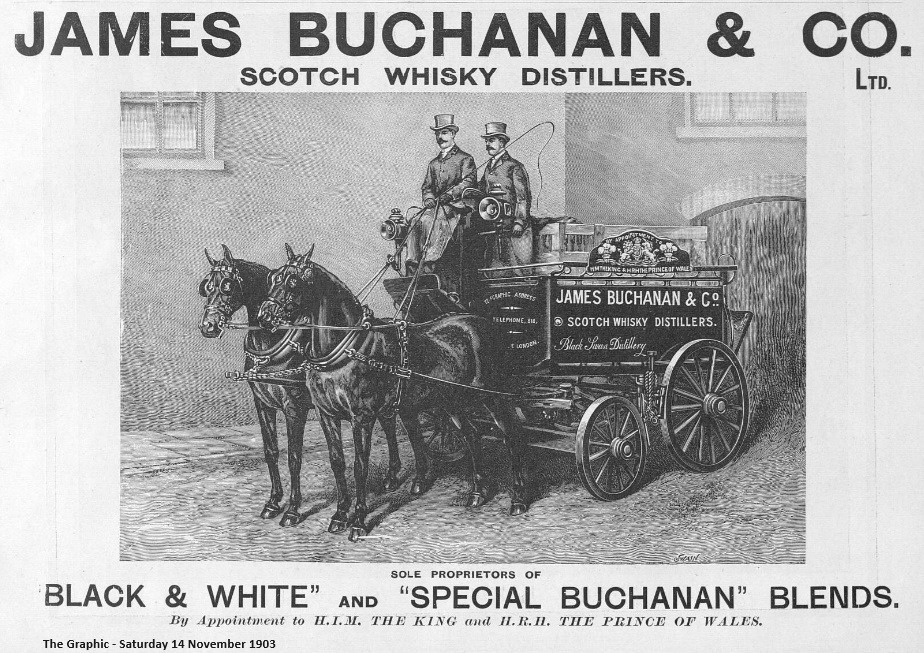
TODAYS TEAM NEWS
Liverpool Daily Post - Saturday 14 November 1903
Everton v Sunderland
League Match at Goodison Park; kick-off 2.45.
Everton- Kitchen, goal; Balmer and Murray, backs; Wolstenholme, Booth and Abbott, half-backs; Sharp, McDermott, Corrin, Settle, and Hardman, forwards. Reserve Sheridan.
Everton Reserve v Heywood
Combination match at Heywood; Exchange 1.10; kick-off 2.45.
Everton.- Whitley, goal; Wildman and R. Balmer, backs; Taylor, Russell, and Makepeace, half-backs; Rankin, Sheridan, Dilly, O’Hagan, and Simpson, forwards. Reserve McEwan.
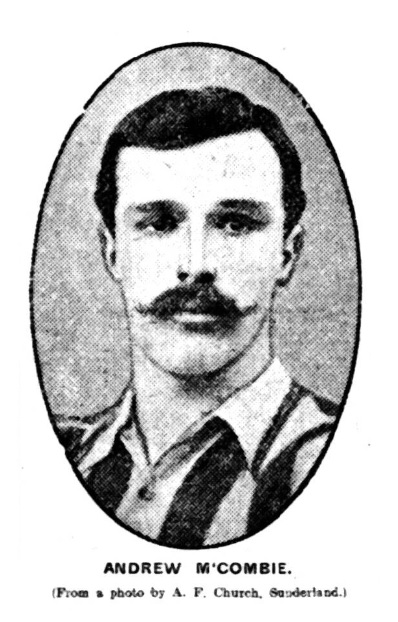
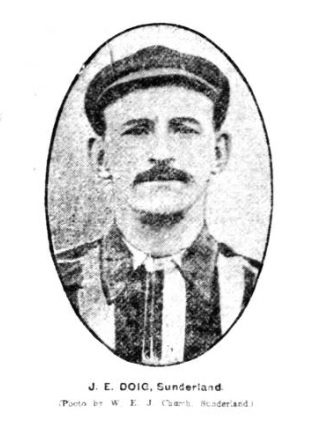
EVERTON v SUNDERLAND
The Liverpool Football Echo- Saturday, November 14 1903
HOGG SCORES EARLY FOR SUNDERLAND
By Pigeon Post and Telephone
A brilliant morning gave place to weather cold and showery, and there was but little promise of the encounter at Goodison Park between Everton and Sunderland being contested under such pleasurable atmospheric conditions as attract a large crowd. Sunderland has long been one of the best do-away clubs in the League for local football crowds, and some of their best performances have been accomplished here. Last season’s encounter with the Blues resulted in a decided victory for today’s visitors, whose defence was all the stronger for the re-appearance of Watson. Although Sunderland have not so far maintained their great reputation, their defence is most difficult to penetrate. As the weak point in Everton’s combination just now in the indecision of the forward line, it was fully realised that victory could only result if they exhibited once more that dash and decision which brought about their earlier victories. Old Sol had gained the masterly of Jupiter Pluvins when operations were commenced before a crowd of 12,000 spectators. Corrin appeared as centre of Everton’s front line instead of Young; while Sheridan partnered Hardman’s instead of Settle. Murray again partnered Balmer, but the half-back line was intact.
The teams faced each other as follow;-
Everton;- Kitchen, goal; Balmer and Murray, backs; Wolstenholme, Booth and Abbott, half-backs; Sharp, McDermott, Corrin, Sheridan, and Hardman, forwards.
Sunderland;- Doig, goal; McCombie and Watson, backs; Farquhar, Barrie, and Jackson, half-backs; Craggs, Budgett, Hogg, Gemmell, and Buckle, forwards.
Hogg kicked off for Sunderland before about 15,000 spectators, there being not much advantage in the choice of position. Right from the start Sunderland showed pressure, and it took all the work that the home halves could do to keep the visitors in check. Abbott at last became the master of the situation, and then Wolstenholme put in a further share of work, after which Sheridan broke away, and sent right out to Sharp, who was instrumental in forcing a corner from Watson. This being cleared. Hogg got sharply through his opponents, and finished with a great shot, to which Kitchen replied with a splendid clearance. Soon afterwards Doig had occasion to clear from Corrin, and a further attack by Everton ended in the same player again trying his hand. Sunderland early on gave a time of their quality, but the Blues soon pulled themselves together and attacked with great spirit and method. Sharp was in his best form, and troubled Watson considerably. A stiff attack from the Sunderland left was ably met by Wolstenholme and Murray and then Abbott chipped in and put the Blues on the attack. Corrin and Sharp kept at it for a couple of minutes but found the visitors defence impregnable. Buckle came down his wing smartly, but Bridges missed his pass badly when he might have headed in. sharp next darted off and finished up a splendid effort by testing Doig severely Doig severely. Buckle and Gemmell took up the attack very gamely, and though opposed sternly by Wolstenholme and Booth, they worked closer in, and Balmer was quite unable to hold them in check. Hogg joined in the struggle and getting the leather very favourably gave Kitchen no chance with an oblique shot at very close quarters. Neat passing by the Evertonians took the ball to the front of Doig and here Corrin shot over the crossbar. A sudden burst by the Wearsiders saw Hogg in front with almost a clear course, but Balmer covered the attacking party in workmanlike fashion. The ball went out to Craggs, who at once tested Kitchen for all he was worth, and the next moment Buckle shot hard for goal, Kitchen again bearing off the honours. Rapid passing by the Everton forwards ended in a fierce bombardment of the Sunderland goal, in front of which the Evertonians missed several chances, McDermott being a prominent culprit. Off-side was given against Craggs and then Everton returned and forced a fruitless corner. Excellent work by the home halves resulted in a corner from Watson, and from this the Blues kept up the attack with great persistency until Sheridan placed behind. Then Hogg and Bridget took possession, and both Abbott and Murray fell in attempting opposition, and matters looked black for Everton when Craggs was pulled up for offside. Sunderland maintained the pressure with great vigour, and Everton’s defence was sorely taxed though every man acquitted himself with credit, or the visitors must surely have scored once more. Booth ultimately routed them on the left, and Corrin and Hardman advanced, but the centre was placed offside. Doig next challenged with a brilliant shot from Sharp, and a moment after when Hardman had a capital opening he put the leather high over the bar, passing between Sharp and McDermott was broken up by Watson, but Sharp came again, and shot into Doig’s hands. A free kick against Sunderland again landed the homesters in front of goal, where Hardman skied the ball over the crossbar. At the other end the Sunderland men displayed fine tactics, but owing to Balmer and Wolstenholme they never had a chance of shooting at goal. A free kick against Buckle changed the scene of play, Sharp centring after the ball had gone out of play, and the sphere being netted by McDermott; but of course, the point did not count. Just afterwards Sheridan got well down, and was about to shoot when McCombie took the ball from his toes. The Blues had done excellent work, and their passings was very pretty and effective, but they always failed to make the most of such opportunities as they brought about. The game was very fast and full of incident. After a really touch struggle in midfield, Balmer fell and let in Buckle, who almost defeated Kitchen the ball just shaving the top bar, whilst travelling at great speed. Corrin next forced a corner from which Doig was tested by Sheriden. Murray next dashed up and spoiled a promising advance by the whole of the Sunderland front rank in line. But the visitors still pressed, and Everton suffered still further from a free kick against them. Booth and Hardman brought relief, and the leather was crossed to Sharp, who put Corrin in possession and Doig had to respond to a “header” from the Everton centre forward.
Half-time score; Sunderland 1 goal, Everton Nil.
Corrin restarted, and Everton went to the front, Sharp doing doughty deeds, but all ending in smoke. On the ball being crossed better method was displayed by the left-wingers, but when the players closed in a general attack Watson had not much difficulty in routing the lot. Later on a centre from Hardman and a shot from Wolstenholme gave tone to the game, but the Evertonians were beaten back, and a shot from Hogg went a few inches wide of the mark. On the homesters breaking away Corrin was given offside, and following the free kick, the Wearsiders bombarded the Everton goal, Bridgett shooting into Kitchen’s hands. The visitors kept up the attack for some little time, but at length Murray succeeded in beating back the invaders. Everton made several efforts to advance on their left, but were held in check, and Sharp fared little better on the opposite wing. Clever work by Barrie enabled his side to attack until the ball went out. Sharp and Mac made another brave effort, but could make no impression on Watson. At this point Barrie got foul of McDermott, and deliberately kicked him, and was dismissed from the field by Mr. Armitt. Everton attacked very vigorously, but it was quite evident that the game was becoming extremely dirty, and Mr. Armitt gave a free kick against Hobbs for an attempted kick. Sunderland came on with a rush, and Balmer missing fire, Kitchen had to run out and concede a corner in clearing. The visitors kept up the pressure, although only playing four forwards. Hardman was roughly treated when doing well, and another free kick in favour of Everton resulted. The three halves neutralised the advantage of a free kick to Sunderland. Final Result; Sunderland 1 goal, Everton Nil.
At Goodison Park last season the Wearsiders gained the verdict by 3 goals to nil.
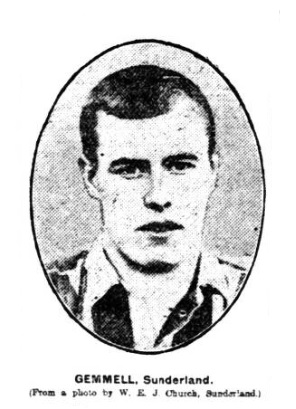
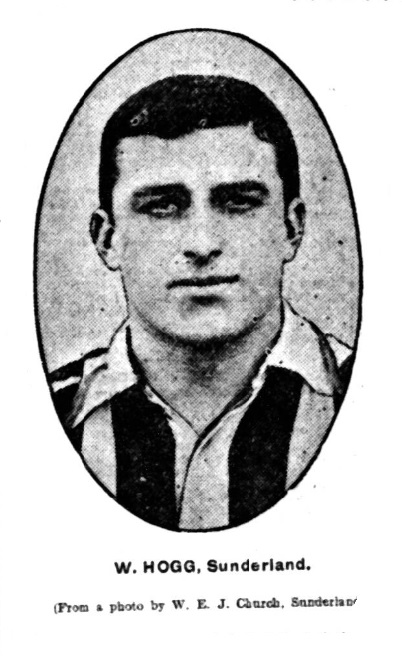
HEYWOOD v EVERTON COMBINATION
The Liverpool Football Echo- Saturday, November 14 1903
LANCASHIRE COMBINATION-DIV A
At Heywood. Everton started against the wind and incline but, notwithstanding, monopolised play. O’Hagan and Rankin tested Whittaker, who saved brilliantly. Heywood then had a look in, but were promptly sent back; and Dilly, racing, scored a good goal. Heywood afterwards were dangerous but Whitley was invincible. A couple of corners accrued at both ends, and the Rankin scored, the ball cannoning off Hodgkiss. Half-time; Everton Reserves 2, Heywood nil.
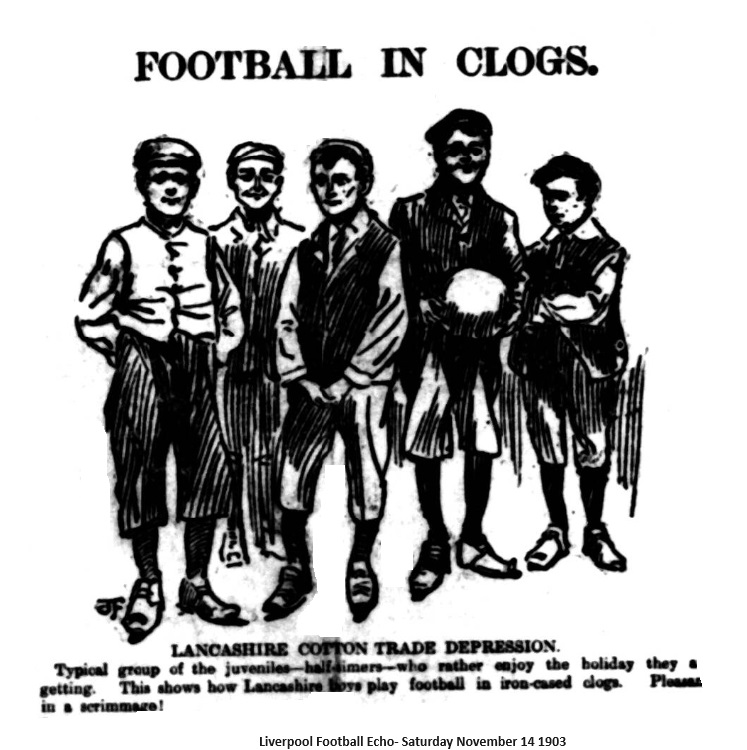
SUNDERLAND TOO GOOD FOR EVERTON
Empire News & The Umpire - Sunday 15 November 1903
AND WIN BY A GOAL TO NIL
By J.J. B
Saturday, like the majority of our Saturday this season, opened with brilliant sun-shines, but it turned out to be too good to last, and the journey to Liverpool was made in a rainstorm. But a little rain does not matter much, the only inconvenience being in getting to the ground and back. Everton were, I think, the first to seriously consider the now generally recognised fact that sixpenny supporters must be encouraged and kept dry. Consequently the Everton club covered in both goal ends, for which no extra charge is made. Most other big clubs have followed suit, and I should say there is no game which provides such accommodation for the working man as does Association football. But, on the other hand, there is no game which is better supported by the working-man. There was a big attraction at Everton on Saturday when Sunderland were due, for the clubs are old and always keen opponents. Fortunately the rain ceased before there was any absolute necessity to go up to Goodison Park, but it had made the ground very heavy, and the wonder to me is that, considering the amount of moisture we have hand, the various football grounds are as good as they are. Sunderland turned out as advertised, but Everton had to manage without Settle (whose place was taken by Sheridan), and Corrin, the ex-Portsmouth player, occupied the centre position. Probably, owing to the races the attendance was not quite up to the mark for such a big match, but still it was of quite respectable proportions. One, however, always expects something out of the ordinary at Goodison Park. Apart from the state of the ground, and really there was not a great deal to grumble at in this respect, the weather conditions were ideal-just cold enough for the players and not too chilly for the spectators. The game opened in fine style, and we settled down under the comfortable impression that we were in for a really fine afternoon of it. But we were afterwards rather disappointed.
The only goal of the match was scored about ten minutes from the start. It was from a centre by Buckle, his partner Bridgett getting hold and easily beating Kitchen. It seemed a simple sort of customer, and certainly one a few minutes later from Buckle far more deserved to score. The Everton men looked as if they meant business, but as Sunderland improved they fell off, especially the rear defence for although Balmer, as a general thing, kicked soundly, he was not in his accustomed form, and did not appear to have a very good understanding with his partner, or it would perhaps be more correct to say that his partner had not a good understanding with him, for Murray was undoubtedly weak. It was a good job for him that Abbott was so energetic in front, for the Sunderland forwards played a hard, determined, and clever game, and sorely tried the defensive powers of Booth and his colleagues. There was more precision in their movements, more certainly of purpose- you could tell what they intended to do- but Everton seemed to make their efforts in a spasmodic sort of way. They often got there, as Doig and his backs were fully aware, and I should say they had quite as many opportunities of scoring as their opponents, but did not take the same advantage of them, and at half-time had to retire with the knowledge of being a goal to the bad.
The second portion of the game was somewhat unpleasant for the play had not proceeded a quarter of an hour ere Barrie, a quiet, unostentatious sort of player, lost his temper, after being fouled, and kicked an opponent. There is no doubt he kicked him, and deliberately, but it did not, somehow, seem such a dreadful affair. However, the referee had to take action, and Barrie was ordered to leave the field, and from this point the game was spoiled. Watson and McCombie did everything they could to prevent Everton scoring, and it was by no means an easy task, for Everton fairly penned them, and the two backs kicked out, and never hesitated a moment in dashing into an opponent. That you could not object to, but occasionally their methods were not quite fair, and McCombie was apparently cautioned by Mr. Armitt. When you lose a colleague, you are apt to do things you would never dream of under ordinary conditions. But all given in, Sunderland, with their weakened forces, are entitled to every congratulation for the manner in which their weakened defence kept out the Everton forwards, who strove for all they were worth to equalise, but failed, and during the last ten minutes Sunderland made several gallant efforts, and were quite as near scoring as Everton had been. however, neither Doig nor Kitchen was beaten, and Sunderland won by own to nil.
Especially taking into account the fact that the Wearsiders played a man short, they fully deserved their victory, for they were the better side. The only position in which Everton held their own was at half back, but in other respects Sunderland were superior. Their forwards were quicker on the ball, and possessed more system, while Watson and McCombie were always resolute and always safe, covering each other splendidly. On the other hand, although Balmer kicked well, and often extricated himself out of difficulties, there was not anything like a clear understanding between the pair of them. Sunderland have some rare, good forwards, clever with the ball, speedy, and just the right build. I was disappointed with Everton, and especially the forwards. Not so much as individuals, for they often displayed marked ability, but there was an absence of general combination-one wing hardly seemed to know what the other was likely to do. The material is there, but it requires welding into shape, especially when approaching goal.
EVERTON 0 SUNDERLAND 1
November 16, 1903. The Liverpool Courier
A.Barrie sent off during second half.
These old rivals met at Goodison Park on Saturday in fine weather, and there were fully 15,000 spectators present when the game commenced. The Everton team underwent alteration from the side beaten at Sheffield Wednesday, Corrin and Sheridan replacing Young and Settle. On the visiting side Watson reappeared, the teams being as follows : - Everton: - Kitchen goal, W.Balmer, and Murray, backs, Wolstenholme, Booth (captain), and Abbott half-backs, Sharp McDermott, Corrin, Sheridan and Hardman forwards. Sunderland, goal Doig, goal McCombie and Watson, backs, Farquhar, Barries and Jackson, half-backs Capes, Briggetts, Hogg, Gemmell, and Buckle forwards. Refere A.Armitt. Everton won the toss, and the visitors immediately showed no advantage, but Abbott tackled in his host style, and Corrin passed out the ball to Sharp. This led to some exciting passages in the Sunderland goalmouth, Watson in trying to kick clear, conceding a corner. This brought no advantage to Everton, and Hogg availed himself of a nice opening and raced away to the other end, finishing up with a shot, which Kitchen cleared. Thus early it was evident that the spectators were to enjoy a spiritedly contested game. Corrin was at faulty through passing back, but immediately afterwards he made amends somewhat by directing a grand oblique shot at Doig, who had some little difficulty in diverting it round the post. The pace was tremendously fast, and each end was rapidly visited. At last Buckle initiated a splendid movement, in which Jackson assisted him, and as two or three of the Everton defenders missed the ball, Hogg had little difficulty in scoring. Everton tried desperately hard to equalise, and after neat passing between Hardman and Sheridan, Corrin found himself with only the goalkeeper to beat. His shot, however, just went over the bar. Still Sunderland more than held their own, and it was only owing to the magnificent goalkeeping of Kitchen that they were kept from adding to their score. First Craggs and then Buckle shot in hard, but Kitchen was equal to the occasion, his save save from the latter when a shot was not expected bring brilliant in the extreme. Everton were not comparing well with their old opponents, there being a want of methods a their attack. At the same they had a fine chance of equalising, but McDermott badly mulled a pass from Sharp, and the defenders did not allow Doig to be called upon. Bridgett was ruled offside when going for goal, and another attack by Everton resulted in Corrin sending wide. The game continued to be contested in the keenest spirit, and in some instance, a little feeling was shown by the players, which perhaps fortunately escaped the notice of the referee. Balmer was the medium of stopping a lively onward movement by Hogg and his comrades, and at the other end, the backs were so good that the Everton forwards rarely troubled Doig. At length the old Sunderland goalkeeper dealt with Sharp, got in a clever shot which coolly, and affectedly. Chiefly through Bridgett the Sunderland right wing got the better of Murray. Bridgett appeared to be pushed down within the penalty area, though the incident passed by unnoticed by the referee, and the ball went out to the centre, where two of three of the Sunderland forwards had a chance of fastening upon it. They dallied and Booth relieved a dangerous situation by a timely kick. Everton made several promising onslaughts on Doig's charge, and once McDermott shot into the net, but the ball had previously been over the line by Sharp. A shot from McDermott was diverted at the expense of a corner, the referee spoke to following with Corrin for unfairly charging Doig. In the course of a vigorous attack by Sunderland Corrin was penalised for pushing, and the free kick caused the Everton defence some trouble. Half-time Everton nil, Sunderland 1. On resuming Everton were the first aggressive, but Sharp was too carefully watched to get in a centre while the visiting defence proved very reliable. Balmer twice stopped ugly rushes by the Sunderland left wing, and from a centre by Hardman, Wolstenholme's shot was wide of the post. Some of the referee's decisions did not pleasure a section of the crowd. Following a free kick Sunderland became dangerous, and after exciting exchanges in the goalmouth, Gemmill ended the tension by playing the ball the wrong side of the upright. A moment later, Kitchen fisted out, from Craggs, and it was becoming evident that Everton were playing a losing game, the forwards being completely out of gear. McDermott and Sharp indulged in some pretty passing, but Watson was too alert for the Everton outside right. There had been several instances during the game of feeling on the part of the players, and the culminated in a regrettable passage between McDermott and one of the Sunderland half-backs presumably Barrie. The latter deliberately kicked the Everton forward, and the referee immediately stopped the game, and after consulting the linesman, ordered Barries off the field. Hogg took up the centre half, position, and with only forwards Sunderland held their own. Doig and his backs survived a determined onslaught, and for a time play was confined to Everton's half. Free kicks were pretty frequent, and from one of these Corrin failed to utilise a nice opening. McCombie brought down Corrin most unfairly, indeed the game was robbed of much of the interest by reason of the dirty tactics resorted to by several of the players on both sides. Final result Everton Nil Sunderland 1.
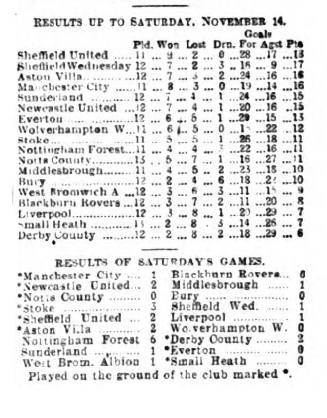
HEYWOOD 1 EVERTON RESERVES 6
November 16 1903. The Liverpool Mercury
Lancashire Combination “A” Division (Game 9)
At Heywood, before 2,000 speatators. Dilly started for Everton, and matters were keenly fought out,. Dilly scored after ten minutes, and Rankin added a second from a cannon off Hodgekiss,. Interval Everton 2, Heywood nil. Play in the second half was again keenly contested, O'Hagan (2) Dilly (2), and Rankin scored for Everton, and Heywood scored from a corner on time, and Everton won by six goals to one. Everton: - Whitley, goal, Wildman, and R.Balmer, backs, Taylor, Russell, and Makepeace, half-backs, Rankin, Sheridan, Dilly, O'Hagan, and Simpson forwards.
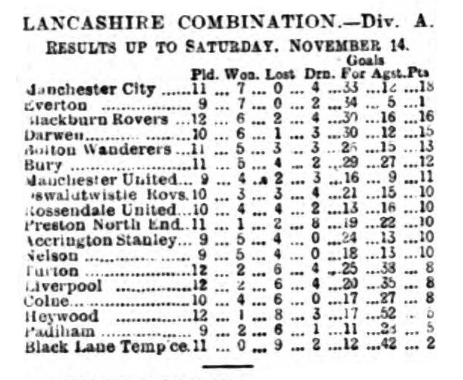
HEYWOOD AGAIN DOWN
Athletic News - Monday 16 November 1903
There were something like 2,000 persons at Egerton Park for the match between Heywood and Everton reserves. Simpson, the cricket professional of the Heywood club, who was included in the Goodison Park team, being an attraction. Heywood had three new men in their ranks, but notwithstanding they suffered another severe defeat, Everton winning by six goals to one. The game was of the ding-dong order. Both goalkeepers did well, Whitley showing remarkable form. Whittaker for Heywood, was a vast improvement on either Joyce, Mannion, or Holt, and no one blamed him for any of the half dozen points registered by Everton. Smith also performed satisfactorily at back and like W. Booth, the ex-Manchester City man, created a most favourable impression for his initial appearance.
EVERTON’S THIRD SUCCESSIVE DEFEAT.
Athletic News - Monday 16 November 1903
By Junius
Sunderland have always been welcome at Goodison Park, and on Saturday their match at Everton attracted 15,000 spectators. The pity is that they were not treated to a more genuine display of football. The Everton directors made a change in their forward line, for Young was dropped, and Corrin was tried in the centre. The experiment was not a success. Young has certainly been off colour, but he has ability and is one the best-natured players that ever kicked a ball. Settle also compelled to stand down, and this let in Sheridan as inside left.
A DISGRACEFUL EXHIBITION.
I am sorry to say that we had a player ordered off the field. Barrie, the Sunderland centre half, was the unfortunate individual, and I use the word unfortunate most advisedly. All through he had exhibited irreproachable form, and totally free from foul tactics. Barrie was the scape-goat for several others. He came into contact with McDermott near touch in close proximity to the linesman. Words were exchanged, and the Sunderland half kicked his opponent, quite openly, with the result that the referee ordered Barrie to the dressing room. I felt sorry for the delinquent. He had been too honest, in his intentions; there were others who better deserved to have marching orders. It will be readily imagined from this that the play was not exactly of a parlor description. A good honest charge I like to see, but reprehensible sly digging at a player I cannot view with complacency, and both sides were equally culpable. Prior to the interval Hogg scored after clever work on the Sunderland left wing and the visitors were the superior side throughout the game. After Barrie’s retirement, the Wearsiders , more than held their own. For a time it seemed as if the players had lost all control of themselves, and fouls for kicking and tripping were constantly occurring. The display was unworthy of the teams, but happily it is many a long day since I saw such a discreditable. The Weareiders deserved to win, for the Everton forwards were practically useless.
EVERTON IN THE DEPTHS
Everton played worse football than they have shown this season. The changes in the forward line were a great source of weakness. I was thoroughly disappointed with Corrin, though I consider it was a blunder to have ever voted him to such a position. I should not care to single out any member of the front rank for favourable mention. The half-backs were effective to a certain point, and Abbott the best of the trio, but Wolstenholme practiced frequent tipping. Balmer was a long way the better of the backs, for Murray was easily beaten, and after hearing the good reports of him the previous week I was utterly unprepared for such a performance. Kitchen kept a capital goal and the shots he had to deal with were very’ troublesome, two rapid successive clearances in the first half when he was at full length being exceedingly clever.
SUNDERLAND’S SUCCESSFUL SONS.
The Wearsiders played vigorous football, and were vastly superior to their opponents in combination, speed, and every other equality that goes to produce an efficient team. Doig had little to do in goal, but he made one beautiful save from Sharp, and is evidently still a force. The full-backs played a sturdy game, and frequently caused the intervention of the referee. Many of their tactics were totally uncalled for, and though they kicked powerfully, they were not averse to fouling when beaten by genuine play. The intermediate line was in great term, completely upsetting the designs of the Everton front line, and forward there was no comparison between them and Everton. Even when Hogg went to centre-half, in Barrie's place, they completely outplayed their opponents, and Buckle was about the most prominent. Craggs put in some dashing work, and with Bridgett, constituted a combination that was only with the utmost difficulty kept in check. They swung the ball about from wing to wing, and were remarkably keen in their movements, while the energy they threw into their work was in marked contrast to the sedate methods of the home side. Everton; Kitchen; Balmer and Murray; Wolstenholme, Booth and Abbott; Sharp, McDermott, Corrin, Sheridan, and Hardman. Sunderland; Doig; McCrombie, and Watson; Farquhar, Barrier, and Jackson; Craggs, Bridgett, Hogg, Gemmill, and Buckle. Referee; T. Armitt, Leek.
EVERTON REVIEW
November 16, 1903. The Liverpool Mercury
As a general rule, when the Sunderland team visit's Liverpool, a capital game of football is witnessed, and more than once have the Wearsiders returned with the full quota of points. They accomplished the latter of these desirability's at Goodison Park on Saturday, but as for the former, it may be at once admitted that a worse game has not been seen on the ground this season. As long as the combatants were content to play the ball some capital work was witnessed, chiefly on the part of the visitors whose superiority was always palpable, but as the game progressed the football deteriorated in quality, and for some time in the second half consisted principally of continued hacking and back heeling an opponent. Varied by the Sunderland full backs occasionally whipping the feet of an Everton player from under him. The visitors were not altogether to blame for they play a vigorous game, and one which in some quarters might be designated as unduly rough, but there were several offenders on the home side and it is to be deplored that their half-concealed, and reprehensible tactics were not nipped in the bud at the start. The culminating point was reached after the interval when Barrie and McDermott came into contact with each other near the touch-line, and after an apparent interchange of words, the Sunderland centre-half kicked his opponent, the result being that, after consultation with the linesman, the referee ordered the delinquent off the field. After this incident the play degenerated into a rough-and-tumble scramble the Wearsiders especially losing their heads, and confining their attentions to their opponents instead of the ball. Fouls were frequently, and it seemed as if the contest would end in an undignified scramble, but gradually the feeling wore down, and the Sunderland ten simply made common backs of the Everton eleven. For teams of the standing of Everton and Sunderland the quality of play that was put forward for the delectation of the crowd was utterly unworthy of them, and though the Wearsiders backs were the greatest offenders in this respect, there were others on the home side equally culpable. To enter into minute details of the play would serve no useful purpose, for the Everton forwards never got going, and against the over-vigorous tactics of the visitors backs could make no headway whatever. Hogg scored for Sunderland after ten minutes play in the first half, a centre from Jackson furnishing him, with a rare opportunity, which was readily accepted. Everton never like equalising, and the best efforts of the side came from Corrin, and Sharp but Hogg proved equal to the few calls upon him. The second half was entered upon with Everton a goal in arrears, and the character of the play has already been described. In the closing stages the visitor's forwards simply did as they liked, and Kitchen experienced a sultary time, but managed to avert further disaster. Thus Everton sustained their third successive defeat, and their second home reverse, the causes for which in each case, singularly enough arose from the same source.
Everton defeat was due to an utter lack of combination amongst the forwards, who acted aimlessly and without purpose, whilst there was an absence of dash, in their movements which, never appeared likely to prevent a reverse. Corrin was a failure in the centre, and rarely attempted to keep the wings moving in concerted fashion, in fact his inclusion as leader of the front line was an experiment entirely without justification. In addition, his rushes were totally devoid of skill, and in some instance, the most notable of which was an ugly jump at Doig in the early part of the game, his play was not of the character one cares to see in football. The wingmen were completely off colour, and could seldom make headway, creditable bits of work being exceedingly rare, and taken as a line, the Everton front rank was wretchedly inept. At half Abbott accomplished some sterling work, and was the most conspicuous member of this division though Booth was at times effective, but Wolstenholme was frequently beaten, and did not enhance his reputation by indulgence in illegal methods in bringing up an opponent. Balmer was the most consistent player in the rear, for Murray was feeble in tackling and his returns were not nearly so accurate as those of his partner. Kitchen kept a capital goal, and made several clever saves, notably from Hogg, who ran clean through before shooting and two successive drives from Craggs and Bridgett whilst in the last ten minutes of the contest he was more keenly tested than at any other period of the game. As he was only beaten once character of his defence may be readily understood. The Sunderland forwards played a very fine game being keen on the ball, and when in possession making straight tracks for goal. Buckle on the extreme left was the principal factor in the majority of the raids on the Everton Citadel, and he gave the home right half a very anxious time for he almost invariably got the better of his opponent. Bridgett and Craggs were likewise dashing members of the attacking line, and Sunderland superiority was chiefly manifest here. The halves were a worrying trio, and it was unfortunate for Barrie that a solitary bit of indiscretion caused his retirement. For he had hitherto played a fair game. Further behind there was not the same cause for satisfaction for the full backs were not very particular as to the manner of dispossessing an Everton player, frequently and deservedly coming under the referee's notice. They imparted unnecessary vigour into their and merited marching orders more than their ill-starred colleague at half-back. Doig had little to do, but he accomplished a few smart clearances, and demonstrated his alertness by one pretty save from Sharp. It is to be hoped, however, that such another exhibition of bad tempered football will not be inflicted upon the Liverpool public for some considerable time.
EVERTON V SUNDERLAND
London Daily News - Monday 16 November 1903
The meeting of these teams at Goodison Park attracted a crowd of 15,000 spectators. Everton were without Young and Settle, their places being taken by Corrin and Sheridan, while Watson again appeared for Sunderland. The game opened at a tremendous pace, Sunderland's atatckl being the smarter. Hogg scored for them after the left wing had done clever work. subsequently both goalkeepers were tested, but nothing further was obtained before the interval. Playof a vigorous order was seen after change of ends. Sunderland appeared to hold the advantage, and after Barrie -one of their players -had been ordered off they still held their own. Nothing more was done, however, Sunderland being left with a victory of one goal to none.
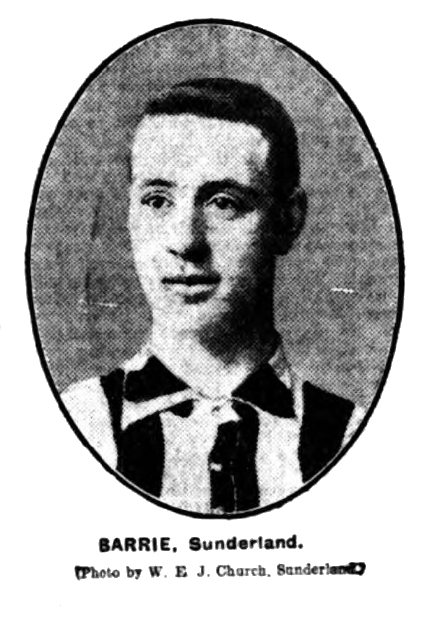
Sent off against Everton at Goodison Park
EVERTON v SUNDERLAND
Liverpool Mercury - Monday 16 November 1903
At Goodison Park, before 15,000 spectators. Sunderland started in vigorous fashion, Kitchen saving finely from Hogg. Sharp raced away, but Doig beautifully cleared. The visitors left retaliated and from Jackson’s centre Hogg easily scored. The Everton defence was kept busy for some time, but eventually the forwards improved and Corrin skimmed the bar. Kitchen again repelled grand shots from Craggs and Buckle, but towards the interval Everton pressed heavily.
Half-time; Sunderland 1, Everton nil.
In the second half Sunderland opened strongly, and Kitchen repelled dangerous shots from Craggs and Gemmell. Everton attacked vigorously, but without much method. Considerable feeling was exhibited by the players, and Barrie (Sunderland) was ordered off for kicking McDermott. Although a player short, Sunderland had the better of the game. Result; Sunderland 1, Everton 0.
Everton;- Kitchen, goal; Balmer and Murray, backs; Wolstenholme, Booth and Abbott, half-backs; Sharp, McDermott, Corrin, Sheridan, and Hardman, forwards.
Sunderland;- Doig, goal; McCombie and Watson, backs; Farquhar, Barrie, and Jackson, half-backs; Craggs, Budgett, Hogg, Gemmell, and Buckle, forwards.
TWO POINTS LOST TO EVERTON
Liverpool Daily Post - Monday 16 November 1903
Everton have stuck another unlucky vein, and on Saturday suffered their third successive defeat, two of which have taken place at Goodison Park. Although the Blues succumbed to Sunderland by the narrow margin of one goal to nil they did not go under without a terrific struggle, and with a little bit of luck they might have shared the points. It was a grand game to witness; not by any means scientific or finished, but of the ding-dong style from start to finish. The Sunderland men’s magnificent defence gained them the day, and hardly one serious mistake was made from start to finish. On the other hand Murray made many mistakes, and Balmer was not blameless, but the three half backs saved worse disaster. Everton failed where it was anticipated -in the front line. Corrin in the centre was full of dash and determination, and a refreshing change from Young’s uncertainty and top-heaviness. Neither Sheridan nor Hardman troubled Watson and McCombie very much. The Everton quintet certainly worked with a will, and forced favourable situations, but at the supreme moment they lacked coolness and decision, as well as the sharp-shooting quality which might have often turned the advantages to account. It was a hard-fought game, where defence mastered attack.
Barrie one of the visitors was ordered off the field for kicking McDermott and in this respect the referee had his hands full, for the game towards the finish was full of questionable work.
G.W.R. EXCURSION TO WOLVERHAMPTON AND BIRMINGHAM.
Liverpool Evening Express - Tuesday 17 November 1903
The Great Western Company’s agents, Messrs. C.W. Bullock and Co., 22, Lime-street, have arranged to run a fast special excursion train to Wolverhampton and Birmingham, leaving Central (Low Level) at 11 30 a.m. and Woodside at 11 35 a.m., due at Handsworth at 2 5 p.m. and Birmingham at 2 15 p.m., on Saturday next, the 21st inst. For the followers of the Everton Club the Great Western route is undoubtedly the best, as Handsworth Station is only a very short distance from the ground, and passengers can proceed to Birmingham by a local train after the match. Another great advantage offered is that the return train arrives in Liverpool in plenty of time to catch the electric cars. Half-day and week-end bookings will be issued by this train.

SATURDAY'S GOAL AT EVERTON-
Sunderland Daily Echo and Shipping Gazette - Wednesday 18 November 1903
"Correction" who sends neither name or address, writes;- "I should like to make a correction, about the goal that was scored at Everton on Saturday. It was Bridgett and not Hogg that received a pass from the left and scored. I hope I have notr intruded, as you see it will be correct." We reported on Saturday that Hogg was the scorer of the goal and on Monday, seeing that some papers credited Bridgett with the point, we made inquiries and were officially informed that our report was accurate. Accordingly, on Monday we made it clear that Hogg was the scorer and not Bridgett.
NEW RIGHT-WINGER FOR COLNE
Northern Daily Telegraph - Thursday 19 November 1903
Fred Wolfe, Everton’s reserve right-wing, has been transferred to Colne. He not had much chance this season In competition with Sharp, Rankin, and Sheridan, Wolfe is 21 years of age, stands 5ft 7in, and weighs 12st 4lb. in all probability he will play against bury Reserve on Saturday.
COLNE'S NEW RIGHT WINGER.
Lancashire Evening Post - Friday 20 November 1903
Colno will be opposed Bury at home, and with the strongest team they have had this season, and the advantages derived from being on their own ground are quite hopeful securing least a point. Bob Hunter will again appear at back, and Wolfe, who this week was transferred from Everton, will partner Ashcroft the right wing.
NUMEROUS CHANGES.
Lancashire Evening Post - Friday 20 November 1903
Everton will endeavour to break their run of reverses, but West Bromwich they will probably find the Albion bad to beat. The Goodison directors have recognised the mistake of leaving out Young in favour Corrin, and the former is reintroduced, while Settle is also expected to be available vice Sheridan. Unless these arrangements result in an appreciable improvement in the Everton attack the Lancastrians cannot hope to win.
HEYWOOD v EVERTON RESERVE
Heywood Advertiser - Friday 20 November 1903
The visit of Everton Reserve to Heywood brought together one of the best “gates” seen at recent matches, about 2,000 persons being present. The presence of T. Simpson, the Heywood Cricket Club’s professional in the Everton team, brought many people to see the game. Heywood made several alterations in the team which met Liverpool on the previous Saturday. Mr. Key of Darwen was the referee, and the teams were as follows;-
Heywood; Whittaker, goal; Hodgkiss, and Smith, backs; Knowles, Walkden, and Thorp, half-backs; Booth, Moores, Bromley, Leeming, and Plumpton, forwards.
Everton Reserve; Whitley, goal; Wildman, and Balmer, backs; Taylor, Russell, and Makepeace, half-backs; McEwan, Rankin, Dilly, O’Hagan, and Simpson, forwards.
Hodgkiss won the toss, and elected to play up the incline but with the strong wind behind them, Councillor Ingham kicked off. Simpson was noticeable in the first minute by a quick run along the line, his centre going out. Again obtaining possession of the ball Simpson shot in, Whittaker clearing in the nick of time. A good kick by Smith have Moores the ball. He put past Wildman, but Balmer raced across and kicked out. A throw in for Heywood in Everton’s quarters was met by Simpson, and he gave to Dilly. The latter got past the home backs, and out-distanced them in the run down the field. Whittaker came out to try and intercept his shot, but the centre made no mistake with his final effort. Everton forced the game, and Dilly shot straight at goal, Whittaker saving grandly just under the bar. The visitors played a clever forcing game, and were much quicker on the ball than Heywood. A corner fell to them, and Makepeace had an opening, but he shot high over the ball. Heywood returned, but the forwards played selfishly, and good opening were spoiled by the man holding the ball too long. From a throw in Leeming headed in the goal mouth, Whiteley kicking away. Neat passing between Plumpton and Leeming carried the ball past the backs, but the former player was fouled. The free kick was taken by Hodgkiss, and he dropped the ball well into goal. It was kicked out, and Hodgkiss had a shy at goal, and Whitley saved magnificently just in the corner. A minute later the home left wing was noticeable, and Plumpton shot into Whitley’s hands. A quick run down by Simpson came to nothing, and Heywood soon returned, Moore causing Whiteley to save again. Then Everton attacked, and Rankin and Hodgkiss had a struggle for the possession of the ball. The forward shot, and the ball cannoned off the back into the net, Whittaker making a good but futile effort to clear. Another sharp attack was made on the Heywood goal, hands against Dilly bringing relief, and then Bromley gave Moores a good pass, the latter shooting with terrific force against the side net. Heywood had a turn of attacking, but the defence of the visitors was very vigorous and Whitley played a great game in goal, saving several shots in splendid fashion. At the interval Everton were leading by two goals to nil.
The second half opened in lively fashion, Leeming and Plumpton were early on noticeable for a good run, Walkden receiving the ball in the end, and shooting out. The home forwards played a more open game than in the first half, and the change proved effective. Several times Whitley cleared with big kicks which carried the ball over the half-way line. Gradually the Evertonians assumed the aggressive. Simpson had a capital opening, but did not shoot. He forced a corner, but nothing came of it. Moore got through with the ball, and was running down for goal, but Russell was too fast for him and danger was averted. A long spell of attacking by the Everton forwards came to nothing, long and mostly badly directed shots being put in. then O’Hagan got possession close in, and easily beat Whittaker. Heywood tried hard to get a point, but the backs adopted vigorous tactics and the home forwards were too light in close quarters. Smith tried a long shot which Whitley fisted away, knocking one of his own backs down in doing so-an occurrence which caused much laughter in the field. At the other end Whittaker saved a dropping shot by tipping the ball over the bar. The corner kick was grandly placed, and Whittaker again saved by putting over the bar. From the second corner Dilly out into the net. Whittaker was obstructed in attempting to clear, but the point was allowed. In the tussle the goalkeeper was injured, and Walkden had to take his place for a few minutes. A good run by Moore and Booth ended in a corner, but nothing came of it. Rankin was breaking away, but Smith robbed him and shot, Whitley allowing the ball to twist out of his hands, but, unfortunately for Heywood, on the wrong side of the post. Directly after this Rankin scored a fifth point. A minute later Simpson centred beautifully, but Dilly missed the ball. A spell of end to end play followed, and then Simpson again centred grandly, and after a scrimmage in goal mouth Dilly secured the sixth point. Clever passing by Moore and Booth took play to the Everton quarters and Blomley was fouled when in a good position, but the referee did not notice the event. Just on time a corner was forced, and after several attempts to get through Whitley was at last beaten.
Result; Everton Reserves 6 goals, Heywood 1 goal.
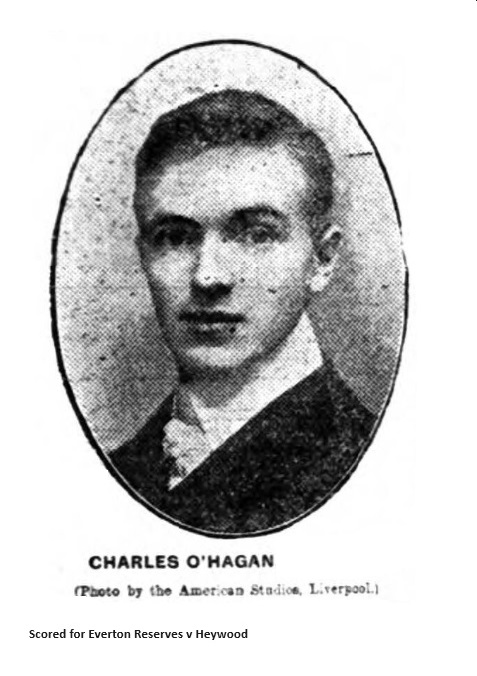
FRED WOLF TO COLNE
Burnley Express - Saturday 21 November 1903
Colne have secured the transfer from Everton, of Fred Wolfe, the reserve right winger. He has not had much chnace this season in competition with Sharp, Rankin, and Sheridan. Wolfe is 21 years of age, stands 5ft 7ins, and weighs 12st 4lb. In all probability he will play today.
TODAYS TEAM NEWS
Liverpool Daily Post - Saturday 21 November 1903
Everton v West Bromwich Albion
League match at West Bromwich; Lime-street Station 10.5. Kick-off 2.45.
Everton.- Kitchen, goal; Balmer and Crelly, backs; Wolstenholme, Booth and Abbott, half-backs; Sharp, McDermott, Young, Settle, and Hardman, forwards.
Everton Combination v Darwen
Lancashire Combination match at Goodison Park; Kick-off 2.30
Everton Combination;- Whitley, goal; Wildman, and Murray, backs; Taylor, Russell, and Makepeace, half-backs; Rankin, Sheridan, Dilly, O’Hagan, and Simpson, forwards.

EVERTON v WEST BROMWICH ALBION
The Liverpool Football Echo- Saturday November 21 1903
A CLEAN SLATE AT HALF-TIME
When the Everton team left Liverpool this morning it was blowing half a gale, and on arrival at Birmingham the wind had intensified in velocity. The long drive from the Midland capital to the Hawthorns was made under very trying circumstances, and on arrival at the ground it was found that very few persons had braved the breeze. The Everton directors made three changes from the side which did duty last week at Goodison Park. Murray, Corrin and Sheridan being replaced by Crelly, Young and Settle respectively. It will thus be seen that today the team was identical with that which opened the season with such signalled success for five Saturdays running. The Albion put their full strength in the field, and tried a new centre forwards in the person of Brown, who came from Northampton with a brillaint record. It was a little before a quarter to three when the men lined up as follows;-
Everton.- Kitchen, goal; Balmer and Crelly, backs; Wolstenholme, Booth (Captain), and Abbott, half-backs; Sharp, McDermott, Young, Settle, and Hardman, forwards.
West Bromwich Albion.- Cook, goal; Adams and Pennington, backs; Nurse, Stephenson, and Hadley, halves; Fenton, Simmons, Brown, Wharton, and Dorset, forwards.
Referee.- Mr. W. Nunnerley.
At this time the wind was blowing almost from end to end. Winning the toss meant no small advantage to the Albion, for immediately on kicking off the high wind materially assisted the home forwards in a strong attack, upon the Everton defence, but Crelly successfully combated with Dorset and prevented disaster. Following a temporary relief by the visitors’ right, the ball was placed over the Everton line. A further movement ended in Wolstenholme giving a corner, which, however, came to nothing, and by steady stages the ball was taken to midfield. In attempting to get further ahead the Everton forwards wisely adopted short and low passes, but it only required an occasional kick by one of the home backs to recover the lost ground. There could be no mistaking that the wind was a most powerful factor, but the Everton half backs played at their best under the circumstances. Eventually Brown was put in possession, after some smart work by Fenton, and when he seemed certain of scoring he shot wide. Then followed a very smart combination between the Everton halves and forwards; and a splendid pass out from Booth and Sharp brought a corner off Pennington. But the vagaries of the wind prevented an accurate centre. A moment later the Albion goalkeeper, by running out, only just beat Hardman in the race for possession. A lusty kick by Adams was somewhat luckily met by Fenton, and it looked very like a goal accruing from Wharton, when Wolstenholme nipped in and granted a second corner. The kick was entrusted to Dorset, and the ball appeared to be curling into the net when Kitchen fisted out for Booth to further save the situation. As was only to be expected, the Everton forwards were rarely found on the aggressive, and on one occasion Hardman got away, and as before he kicked too wide ahead, with the result that the ball rolled harmlessly over the line. The next item of interest was a sudden breakaway by the home left, and Dorset, from close range, sent in a hot shot, which passed outside. Following upon this, some excellent work on the part of Settle brought the team close to the Albion goal, but the clear inside left, on taking the ball, was ruled offside. After an ineffective visit to the Everton goal, where Balmer cleared the line, some very clever footwork was shown by the whole of the Everton forwards. The movement ended in Hardman putting in a magnificent centre, but fortunately for the Albion, Cook was just in the right position to fist the ball away before he was bundled through by McIntyre. Considering the elements the Evertonians were now having a fair share of the play. It was by some very clever footwork, contrasted with the long kick and rush of the Albions, that they made progress end needless to state those moves were greatly admired. The close attention of the Albion backs, however, frustrated the Evertonians efforts to score, and eventually a long kick and rush enabled Symonds to have a “pot” at goal, the ball going safely into Kitchen’s arms. A minute later Brown followed suit by shooting into the Everton custodian’s hands, and from the clearance Young deftly passed out to Hardman, with the result that the Albion goal had an extremely narrow escape from capture. The two backs were lying on the ground just a few yards from the goal being generally mixed up with the ball, with the three inside Everton forwards on the top of them, but the exciting struggle terminated in nothing more than a fruitless corner. It was certainly the narrowest squeak so far, and had Everton made a tangible opening none would have begrudged them on the play. During the next few minutes Dorset was particularly busy, for he got down no less than three times in rapid succession, only, however, to fail at the last moment. Still the home forwards persisted in their attentions to Kitchen’s charge, and it was only the soundness of the Everton defence that averted disaster. At the same time the visitors did not relax their efforts, and once Sharp looked very like getting through when he was knocked off the ball by Hadley. Almost immediately after this Hardman got possession, and raced off at top speed. He was afforded a glorious opening, when he shot ridiculously wide of the mark. Then Albion once more took up the attack, and, adopting a short passing game, more than once became exceedingly dangerous, but the Everton half backs played really magnificent football, and time after time they broke up the forward line of their opponents. Towards the interval the homesters tried desperately hard to draw ahead, and Abbott. Fouling Simmons close into goal, gave them a fresh opportunity. A free kick led to a terrific struggle, which terminated in a corner, but the place kick was carried over the line by the wind. Everton took up the running once more, and the ball was carried well into home territory, but here their kicking was as wild as the wind, and it was not long before the Albion were again moving in the direction of Kitchen. Their shooting was equally erratic, however, although once Simmons sent in a hot shot, which caused Kitchen to fist out. Just before half-time Everton made an superlative effort to score, but without success, and half-time came with no goal scored. There was a fairly good crowd present when play was resumed. The opening exchanges were very tame, the ball being kept close to the centre line. At length the home forwards moved down in very promising fashion, and Dorset sent in a long dropping shot which landed on the top of the net. The outside left was in evidence a few seconds later with a swift ground shot, but this was charged down by Crelly. The Evertonians then took up the attack, and for some time they penned their opponents in. a stubborn resistance, however, was offered by the home defence and at length Hadley relieved the pressure by serving up nicely to Dorset and Wharton. The last-named player got away smartly, and looked exceedingly dangerous when Wolstenholme nipped in and cleverly cleared. Considering that they now had the wind in their favour, the visitors were not pressing as strongly as was expected of them, but the gale was evidently telling its tale on the home eleven. Final Result; West Bromwich Albion Nil, Everton Nil
Everton were beaten by 2 goals to 1 at West Bromwich last season.

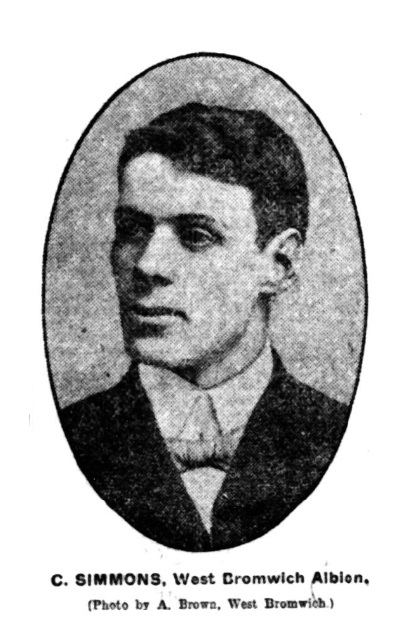
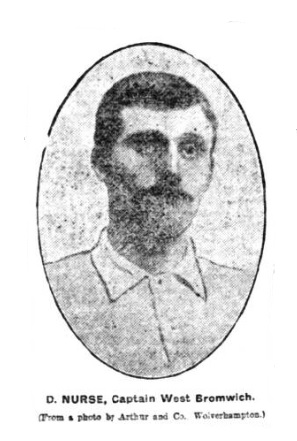
EVERTON v. DARWEN
The Liverpool Football Echo- Saturday November 21 1903
LANCASHIRE COMBINATION -DIV A
At Goodison Park, this afternoon before a capital gate. The following were the teams;-
Everton;- Dent, goal; Wildman and Murray, backs; Taylor, Russell, and Makepeace, half-backs; Rankin, Sheridan, Dilly, O’Hagan, and Simpson, forwards.
Darwen.- Hill, goal; Woolfall and Duckworth, backs; Graves, Wilson, and Tomlinson, halves; Buck, Gale, Hall, Crook, and Hinds, forwards.
The visitors won the toss, Dilly kicking off for the Blues, and play for the first few minutes was of a very even character. Simpson had rather hard lines when close in, and at the other end Dent saved from a fast kick on the line. Some brilliant forward play by the home team followed and the Darwen goal was in jeopardy on more than one occasion, but Hill with the aid of Woodfall and Duckworth, staved off defeat. A clever sequence of passing by the visiting left wing enabled the Darweners to get close in, and Dent was again called upon to negotiate a shot which Wildman had failed to geta away. This the home custodian did successfully, and Everton went away on the right in fine style, Rankin finishing up by shooting over the bar. Darwen then got possession and took play to the half-way line, but Everton were soon again on the aggressive, and the visitors’ goal was subjected to hot pressure. The defence however, of the Darwen team was impregnable and the vigorous efforts of the Evertonians to draw first blood were futile. Towards the interval the Blues persistently attacked the Darwen goal. Rankin being conspicuous on the forward line, but the clever tactics of the home side were nullified by the grand defence of the visitors, and the interval arrived with a clean sheet.
Final.- Everton Reserve nil, Darwen nil.
W.B. ALBION v EVERTON
Sports Argus - Saturday 21 November 1903
LIVELY CONTEST PRODUCES NO SCORING
By Marvis
The greatest interest centred round the meeting of these tram at the Hawthorne this afternoon by reason of the inclusion in the Albion team of Brown, the centre-forward who has just been transferred from Northampton, while their victory last week over Small Heath has encouraged the spirits of the followers of the West Bromwich team. Apart from the substitution of Brown for Cole the Albion eleven was the same as last week, while Everton also put on a strong team.
Albion;- Cook; Adams, Pennington; Nurse, Stevenson, Hadley; Fenton, Simmins, Brown, Worton, Dorset,
Everton.- Kitchen; Balmer, Crelly; Wolstenholme, Booth, Abbott; Sharp, McDermott, Young, Settle, Hardman.-Referee Mr. W. Nunnerley (Wrexham)
The weather, unfortunately, was most unpropitious, a strong and gusty wind blowing at varying angles all the afternoon. There was only a moderate attendance to welcome the players when they came on to the field, but the number afterwards increased to about 10,000. The Albion won the toss and elected to kick towards the Smethwick goal with the wind, if anything, in their favour. The home forwards were the first to get away, but they were promptly pulled up by Crelley. Adams performed a similar operation when Hardman and Settle were getting down the field, while the Albion returning again to the attack Wolstenholme kicked outside when Worton and Dorsett were nicely going. Adams again came to the rescue after Stevenson had made a mistake. It soon became the Albion turn again, Brown beating Booth and passing out nicely to Fenton, who, however, failed to take full advantage of his opening. The new Albionite next essayed a shot for goal, but the ball just went wide. Some pretty work by Young and his inside men enabled them to get dangerously close in, but Nurse relieved, and a fruitless corner was awarded the visitors. Returning to the attack Cook had to rush out to save from McDermott, while at the other end Crelley gave a corner when the Albion left was getting too close in. The Everton goal had a narrow escape from this, but danger being averted the visitors had a look in, Hardman missing what seemed a fair opening. Dorsett secured the ball nicely from Worton, and put in a stinging shot just as the whistle blew for a foul, apparently against Worton. The players generally were indulging in hard kicking, still the wind greatly interfered with the ball. Everton at this point were conspicuous for some very smart play. The forwards worked the ball well down, and Hardman and Settle were getting perilously near when Nurse got back to them and succeeded in stopping their career. Again Hardman right from the corner lifted the ball into the goal month, Cook only just punting away in time. At the opposite end Kitchen came in for a cheer for the way he saved from Simmons, while Blown twice in quick succession shot just over the bar. Hardman had the goal at his mercy, but when he got right in goal he muffed his shot. Cook was on the ball in an instant, and after a struggle it was sent outside. It was a narrow escape, and one or two others followed from the same quarter. Hardman seemed to have chance after chance, but he made a poor mess of them. Pennington cleverly pulled up McDermett when the latter was getting will in, while at the opposite side Dorsett several times had hard line, and Simmons just failed to find the net with a long dropping shot.
Half-time :--- Albion 0 Everton 0
Crossing over the Albion were the first to become aggressive, but Balmer was equal to the demand made upon him. Returning to the attack Dorsett, receiving the ball from Simmons, sent to ball just over the bar. Then it became Everton's turn, and Cook had to save a low shot from Young, but the visitors were not long allowed to remain in their opponents' quarters. Dorsett got nicely away only to find in Crelley a match. Worton cleverly got the better of McDermott, but the wind spoilt his pass to his partner. Still play was kept for a time in the Everton quarter, the backs having a very busy time of it. Worton and Dorsett were very conspicuous, but they were closely watched by Balmer and Wolstenholme. An awkward breakaway by Hardman and Settle looked dangerous for the home side, but Nurse pluckily stuck to his task and averted danger. Working their way down, there was an exciting scrimmage close in the Albion goal, but eventually the ball was sent outside. A foul to the visitors looked like being serious for the Albion, but the wind carried the ball into touch. Everton were just now doing more than their share of the pressing, and the wind helped them greatly in keeping the ball in the Albion territory. Cook hand a handful from McDermott, but he got the ball safely away. The Albion got going again, a shot from Dorsett being cleared. Nurse had a turn putting in a beauty, which Kitchen had some difficulty in saving.
Result W.B Albion 0 Everton 0
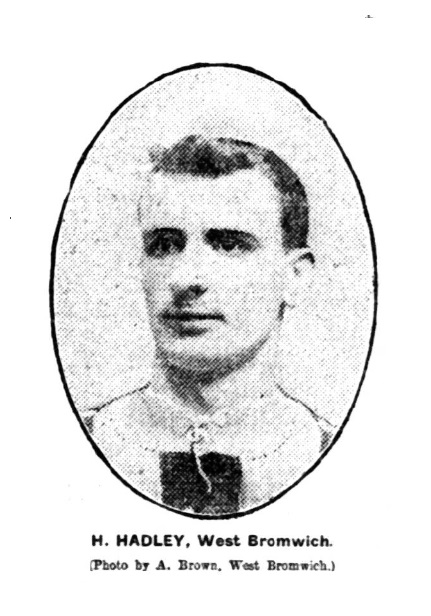
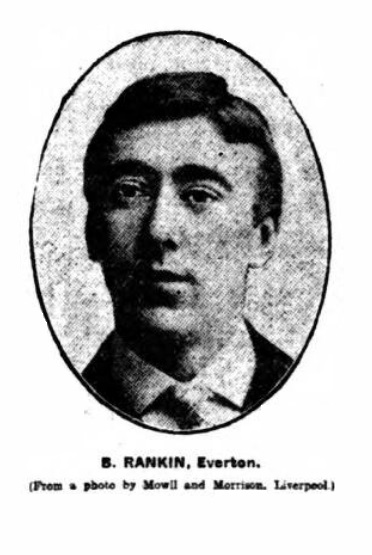
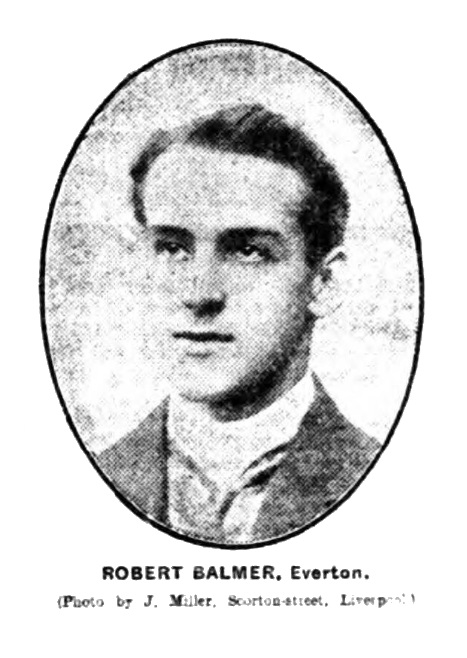
WEST BROMWICH ALBION V. EVERTON
London Daily News - Monday 23 November 1903
Like most other places, the West Bromwich ground was visisted by a gale of wind on Saturday. Everton had the advantage of this in the first half, but the Albion soon pressed, and Brown sent in a shot which went outside. The visitors got away again, and Cook had to save twice from Hardman, who later on very nearly got a goal. However, nothing had been scored at the interval. The Albion left wing showed up very prominently after change of ends, Dorsett making some very fine runs. Niether side could get the mastery, and an evenly contested match resulted in a draw without any score. About 8,000 people watched the play.
WEST BROMWICH ALBION 0 EVERTON 0
November 23, 1903. The Liverpool Courier
Everton visited West Bromwich Albion on Saturday in order to fulfil their fixture with the Albion. Crelly, Young, and Settle, resumed their places in the team, while on the Albion side Cook, was in goal instead of Webb. About 8,000 spectators were present when the teams turned out as follows: - West Bromwich Albion: - Cook, goal Adams, and Pennington, backs, Nurse, Stevenson, and Hardly half-backs, Fenton, Simmons, Brown, Worton, and Dorsett, forwards. Everton: - Kitchen goal, W.Balmer and Crelly, backs Wolstenholme, Booth (captain), and Abbott half-backs, Sharp, McDermott, Young Settle, and Hardman forwards. Referee W.Nunnerley. The Albion won the toss, and Young started for Everton, who speedily gained a corner, which was prettily placed. A tussle in the goalmouth caused the home defence some anxious moments, but relief was finely brought by Settle, who, in trying to head the ball into the net, put it the wrong side of the post. The Throstle gradually assumed the upper hands, and at once the Everton defence had plenty of work to do. At this period Balmer gave an excellent display, his kicking and tackling being very strong. The Everton repelled more than one determined attempt to get the ball into the net right back. Brown hit the bar with a stinging shot, the ball rebounding into play, and Balmer heading away. It was however, quickly returned by Hadley and once more Balmer interposed with his head, the leather going over the leather going over the line. The visitors now woke up, and a series of sudden rushes were made to their opponents half. Cook had to clear from Settle, and receiving the ball from McDermott, Young sent in a low swift shot which Cook fisted out with difficulty at the expense of a corner which yielded nothing tangible. The home side were now aggressive, and the spectators loudly cheered grand work by the left-wing. Dorsett put in a lovely centre, but Brown failed to meet it and a good chance went abegging. After midfield play Hardman was pulled up with a stinging shot. The custodian cleared his lines, although in so doing he had to concede a corner. This was placed too far down the field, and enabled the Albion to make headway. A foul against the home team brought the ball into dangerous proximity to Cook, who had to run out to save a fast low shot from Settle. An exciting rare between Sharp and Stevenson was the next feature of interest. The former was too quick for his opponents, and taking a flying shot the ball cannoned off Pennington and went off over the line. Nothing came of the corner, and for some little time neither side gained much advantage. Going away together the Everton forwards again pressed, only to find Cook a safe custodian. Some nice dribbling in which Simmons, and Fenton were conspicuous, was deservedly applauded by the spectators, and notwithstanding a vigorous effort by Crelly to repel the rush, Fenton got in a shot, which Kitchen kept out in brilliant style. A long kick by Balmer sent the ball to the toe of Young, who, however, was not allowed to proceed far when tackled he promptly passed out to Sharp, who raced off the other end, and finished by sending the ball over the bar. As the result of another attack, Young gave Cook a warm handful, Abbott meeting the return put in a low swift shot, and once again Cook had to clear. Still keeping the pressure they forced Adams to concede a corner. This was not too well placed, and was easily cleared. The interval arrived without neither side having scored.
Restarting, Albion fought hard to break through the defence, but their forwards showed a tendency to get offside their shooting, too, being erratic. Next the home defence conceded a couple of corners in rapid succession, neither of which proved of any avail. Smart tackling by Booth robbed Fenton of the ball just as he was becoming dangerous. Once again the Everton forwards by a grand effort carried the ball through all opposition to the very mouth of the home goal but the defence prevailed. For some time there was great excitement as the ball hovered round the Albion goalmouth, and had the custodian not been so safe, a goal must have followed. A foul against the visitors brought relief, and for some minutes honours were fairly even, the ball never crossing within a dozen yards of either goal. Crelly passed the leather to Abbott, who after running a few yards passed to Hardman. That player assisted by Settle, carried the ball along, and then Hardman swung it across, only for Young to meet it and send high over the crossbar. Play continued to be very fast, and the game was full of incidents. Once Sharp banged the ball against the crossbar, whence it rolled on to the top of the net. The game was exciting to the close, but nothing was scored, and the points were divided. Result West Bromwich nil, Everton nil.
EVEN GAME AT GOODISON PARK
Athletic News - Monday 23 November 1903
By junius
In the Lancashire Combination match with Darwen, at Goodison Park, the Everton reserve –like their seniors at West Bromwich –failed to score, and the result was a draw. The result just about reflects the general character of the play, and both sides missed good chances of scoring. Darwen’s defence was really excellent, the full backs saving the situation on several occasions while their custodian cleared finely, one save from Russell being extremely clever. The Everton forwards, on the other hand, were remiss in shooting, and spoiled many fine openings by their inaccuracy in this respect. Darwen’s best form was shown in the second half, but the result fairly expresses the general character of the contest.
POOR PLAY AT WEST BROMWICH
Athletic News - Monday 23 November 1903
Br Brum, Jun
Under conditions such as those which prevailed at West Bromwich on Saturday, the smartest team in the country could be excused if they failed to show their best form. Situated at a very high altitude, and with miles of open country on the one side, the Hawthorne caught the full force of the gale, and the goalless game between Everton and the Albion was reduced almost to a farce. An idea of what the game was like can best convoyed by mentioning that there were not more than two shots, I can only recall one as a matter of fact, which looked at all like scoring, and none which actually did so. The one shot I remember came late in the second half. Nurse had worked the ball up the field cleverly, and just when everyone expected him to pass it on to the forwards the players opened out and the Albion skipper had a clear opening with only Kitchen to beat. Nurse always plays with his head, and the moment he saw the chance he drove the ball hard and straight. It was well for Everton that Kitchen was equally alert, for the custodian, divining Nurse’s intention in a fraction of a second, dashed across the goalmouth and arrested the progress of the ball, simultaneously with the crowd roaring “Goal." Beyond this there is little tell.
TWO CHANCBS LOST
The two really good chances of the game fell to Hardman, the young Everton outside left, or to be accurate, Hardman made them. Both occurred in the first half, and the Blackpool youth had gone clean through the backs on each occasion. The first time he stumbled, and instead of shaking the rigging, as everyone expected, he could only touch the ball so gently that it barely rolled up Cook. On the second occasion he made , allowance for the wind, but at the psychological moment there was a lull in the storm, and instead of curling into the corner of the net as Hardman had intended, the leather went straight, and wide. The Albion had the assistance of their recent capture, H. Brown, of Northampton, and what sort of exhibition the home forwards would have given without him I do not know. It was bad enough as it was in all conscience, but in keeping the wings moving and in shooting for goal on every possible occasion the new centre considerably brightened the work of that department. The Albion directors feel that some of the critics are not treating the club too well, but it is not compatible with justice to one’s journal to say flattering things of a forward line which so completely and considerably fails as does the Albion vanguard.
CRITICISM
It would be folly to attempt to delude either the officials or the supporters of the club by saying that the men are all right, but merely unlucky. Unlucky they may be; so are other forwards at times. The-Albion forward line at the present moment is the weakest they have had for a long time. The Albion’s inability to get goals speaks for itself. In thirteen matches they have registered eleven goals and when you deduct those' scored by the half-backs you have very few left to divide amongst the forwards. The half-backs, as usual, did rare work, and Adams and Pennington seem well mated behind. There is much to admire about Cook, Webb's understudy, and although he cost the Albion £150 I should regard him as a cheap man. He is sure, agile, and displays any amount of resource and coolness in tight corners. He demonstrated his nerve in one very hot scrimmage almost the goal-line. If the form of Kitchen, Balmer, Crelly, Wolstenholme, Booth, and Abbott shown at West Bromwich is a fair sample of the kind of service they generally render to their club it is not easy to imagine Everton being let down by the defence. Forward Hardman and Settle were the best wing, and Young always had his eye on the goal. Against Hedley, however, Sharp had a poor chance, and he did nothing throughout the match. West Bromwich; Cook; Adams, and Pennington; Nurse (captain), Stevenson and Hadley; Fenton, Simmons, Brown, Worton, and Dorsett. Everton; Kitchen; Balmer, and Crelley; Wolstenholme, Booth and Abbott; Sharp, McDermott, Young, Settle, and Hardman. Referee; Wm. Nannerley, Wrexham.
EVERTON RESERVES 0 DARWIN RESERVES 0
November 23, 1903. The Liverpool Mercury
Lancashire Combination “A” Division (Game 10)
At Goodison Park. The home side had most of the play, Darwen's backs showing splendid defence. Rankin tried many shots, the interval arrived with no score. During the second half, Everton had the best of the exchanges, but bad shooting spoiled all their efforts and the game finished with no goals. Everton: - Whitley, goal, Wildman, and Murray backs Taylor, Russell, and Makepeace, half-backs, Rankin Sheridan, Dill O'Hagan, and Simpson, forwards.
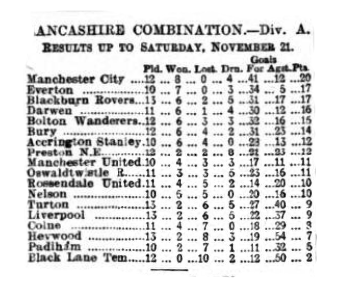
EVERTON REVIEW
November 23, 1903. The Liverpool Mercury
Everton on Saturday made some amends for their grievous disappointments, of the three preceding matches. The outcome of their visit to the Hawthorn's was that they divided the points with west Bromwich. This was a distinct improvement, upon the result of their last appearance at West Bromwich. On that occasion they were defeated by two goals to one, on Saturday although not a goal was scored, they had the satisfaction of adding one greatly desired point to their record. Considering the high wind, which prevailed throughout the whole of the proceedings, the game reached an commendable standard of merit, especially in the first half. Really it was during this period, when Everton, had to face the full force of the breeze, that they displayed to advantage, their abilities in each department, unfortunately, however when the side crossed over they committed tactical error of playing practically the same game, although the conditions were altogether different. Having the wind in their favour, one would have though that every possible chance of getting in a shot at goal would have been readily seized, and it was largely owing to the lack of judgement that the Evertonians had to rest content with a division of the honours. One rearely looks for a high-class exhibition of the game under conditions such as held away on Saturday, but those spectators that made the journey to the ground, must have had a feeling that they were simply rewarded for their support. Against the strong breeze the Everton forwards and halves display rare judgement in their movements, and their close passing was generally greatly admired. When the final stages were reached it was only to be expected that the vagaries of the wind would mininise their prospects of ultimate success in finding the net, at the same time, there was more than one occasion when the home custodian was a trifle lucky. The Everton left wing pair were frequently dangerous, and had Hardman not kicked the ball too far forward, preparatory in taking a shot, thus enabling the home custodian to run out, the chance were that a solid foundation to success might have been laid early on in the game. Meanwhile, the Throstles were pursuing totally different methods. The long kick, the rush, and the endeavour to break down the defence were always apparent and under the existing circumstances, were the more likely to bring about successfully results. In the Everton defence, however, they found a set of sturdy contestants, and when at the interval, they had derived but little advantage with having such a powerful factor, as the wind with them, it was generally conceded that the visitors had done exceptionally well in keeping their goal intact. Upon resuming, the play was for sometime of a very tame description. The visiting side did not appear to let themselves go, and their inability to take full advantage of their position, seemed to give confidence to the Albion, who subsequently offered the most strenuous resistance, for the most part of the play was confined to the Albion half of the field, and the fact that the Evertonians were not able to pierce the net, reflects ably upon the work of the home defenders. It was a game, in which the Everton half-backs might have materially added to their laurels, though it must not be inferred that their display was lacking in general efficiency. With the Albion backs and halves stopping at nothing whereby they might check the movements of the Everton forwards, it was not too much to expect that Wolstenholme, Booth, and Abbott would with the strong breeze behind them, take every opportunity at popping at goal when within range, especially on such a day when the elements of luck plays such an important part. The Everton forwards during the first half of the game gave a really clever exposition of the shoot passing game against the wind, and in the attacks that were incisive Settle, and Hardman played a prominent part, Young improved greatly upon his display at Owlerton a fortnight ago, and McDermott and Sharp completed a line that under ordinary conditions would have caused much anxiety to most defenders. The half backs with the exception that they might have tested the custodian more frequently acquitted themselves in creditable fashion, and Balmer and Crelly were rarely at fault in meeting the ugly rushes of the Albion forwards. Several capital shots were sent in at Kitchen, and he was unbeaten, reflects well upon his resourcefulness. On the Albion side, Dorsett was the mostly prominent forward, but this was due to the fact that on almost every occasion of an attack the ball was passed out to the left wing, his speed and accuracy in bribbling the ball, stamped him as a clever player, and many of his movements were the result of frequent attention from the centre forwards. Brown of Northampton-who created a very favourable impression. The halves and full backs were indomitable workers, and Cook's work in goal left nothing to be desired.
EVERTON SECURE A POINT
Liverpool Daily Post - Monday 23 November 1903
Although the Everton team returned from West Bromwich with a point to their credit, they should, accordingly to the play, have bagged a brace. The gale which raged furiously throughout the ninety minutes interfered very considerably with the course of the game, and nothing like a true exposition of first-class football was possible. Curiously enough the Evertonians appeared to the greatest advantage in the first half, when they had to face the wind. They kept the ball low, and indulged in exceedingly clever short passing, and with a little more accuracy in front of goal they must inevitably have scored on several occasions. When the team crossed over one quite expected that the visitors would recognise the advantage of altering their tactics. That is to say, that, with the wind in their favour, they would try the long kick and rush. This, however, they persistently refused to do, with the result that they never gave the home custodian a really hard shot to tackle. Apart from this Everton were undoubtedly the better team, the footwork of the forwards and the splendid combination of the half backs exciting the admiration of even the home spectators. Both Sharp and Hardman put in a lot of fine work on the wings, but their efforts were often nullified by the slowness of the inside men, McDermott being the principal offender in this respect. Of the half backs trio it is impossible to write too cordially, and the backs were both safe and sound. The Albion tried a new centre forward in brown, of Northampton, who looks like proving a highly serviceable recruit.
ALBION GET A POINT
Birmingham Mail - Monday 23 November 1903
The game at the Hawthorns was of a scrambling character all through, and seldom gave one the impression that goals would be scored. Efforts at combination were few and far between, and when there was an attempt at cohesion the wind generally upset the calculation of the players. Viewing the match in a general way the merits were about represented by the result-a goalless draw. A good deal of interest centred in brown, the Albion’s new centre-forward, from Nottingham, and he and Dorsett were seen to more advantage than their colleagues, but all through the chief feature of the match was the sound defence on both sides. The Albion backs and goalkeeper were very safe while Nurse was prominent in the half back line. So finely did Crelly, Balmer, and the half-backs play that the Everton custodian was very seldom troubled.
WEST BROMWICH ALBION v EVERTON
Liverpool Mercury - Monday 23 November 1903
At West Bromwich, in a perfect gale of wind. There were 11,000 spectators. The Albion, who played their new centre, Brown (Northampton), had the best of the play at the start, but Kitchen defended so well that their shots came to nothing. Hardman and Settle were concerned in most of the Everton attacks, and Cook saved finely from a scrimmage. Half-time-Albion, nil, Everton nil.
On resuming, the game went in favour of the visitors, who now had the wind at their backs. Both Hardman and Settle came near scoring, but Cook proved himself a thoroughly reliable custodian. The play became monotonous. Nurse all but beat Kitchen with the only good shot of the half.
Result- West Bromwich Albion 0, Everton 0
Everton.- Kitchen, goal; Balmer and Crelly, backs; Wolstenholme, Booth (Captain) and Abbott, halves; Sharp, McDermott, Young, Settle, and Hardman, forwards.
West Bromwich Albion.- Cook, goal; Adams and Pennington, backs; Nurse, Stepheson, and Hadley, halves; Fenton, Simmons, Brown, Wharton, and Dorset, forwards.
TIT-BITS OF “THE” LEAGUE
Football Chat and Athletic World-Wednesday, November 25, 1903
By “Montesuma.”
Quite a curiosity of the season in the continued inability of Everton’s forwards to locate. In their last five matches, Young and his linesmen have not once found the rigging. Compare this with the work of the same quintette in the first five matches, and we find food for reflection. Therein the Toffees begged a dozen goals. Everton were at west Bromwich on Saturday, where each side was fully representative, the Throstles trotting out Brown, their Nottingham recruit, at centre-forward. It was a big, strenuous contest, wherein the bulk of pressure lay with the home team, but Balmer, Booth, Wolstenholme, and Abbott proved at their best, Kitchen, too, keeping a fine goal. Curiously we had a Kitchen in one “domicile” with a “Cook” at the other end. It is high time the Toffees set about goal-getting though. I fancy their turn will arrive this week-end. As for the Albion, they are still clear of the last two places, but one victory from seven home matches is scarcely good enough.
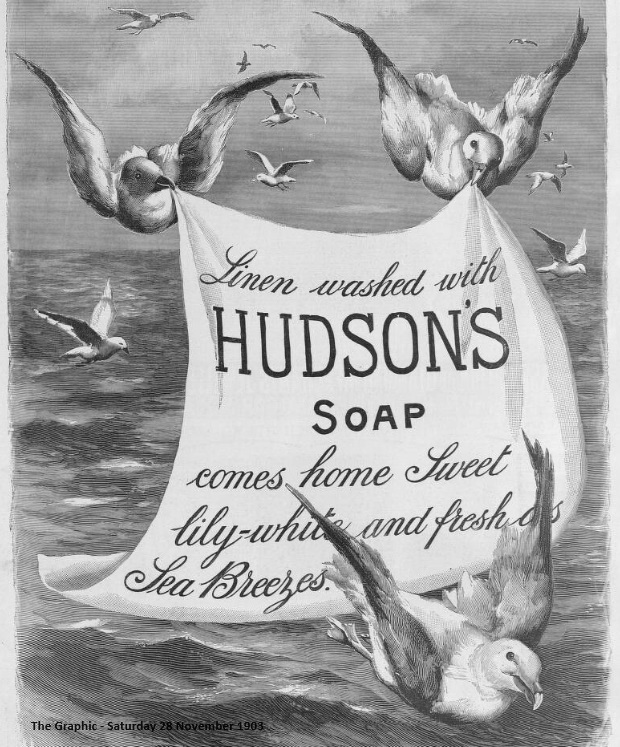
EVERTON v. SMALL HEATH.
Nottingham Evening Post - Saturday 28 November 1903
In terribly wet weather this match was played at Goodison Park before 8,000 spectators. Small Heath had their strongest side, while Everton played Taylor, and Corrin for McDermott and Hardman. Considering the adverse conditions the game was contested at a great pace. Sharp converted a penalty against Stokes, and Leonard equalised with a capital shot, while Abott headed through for Everton from a corner. Interval; Everton two goals; Small Heath, one. In the second half Everton had by far the best of the game, their forwards and half-backs playing a brilliant game. Robinson kept a fine goal, but was beaten first by Young, and then by Booth, while Taylor added a fifth. Everton had all the play to the finish. Result; Everton 5, Small Heath 1.
EVERTON v SMALL HEATH
Liverpool Football Echo- Saturday, 28, 1903
SHARP OPENS EVERTON’S ACCOUNT
JONES SOON EQUALISES
ABBOTT GIVES HIS SIDE THE LEAD
By Pigeon Post and Telephone
Small Heath, who visited Goodison Park to-day, occupy a very lowly and humble position in the League table. As a matter of fact their acquaintance with First League football has, during past years, been of a particularly fluctuating character. The home team’s recent performances were not calculated to draw much of a crowd, as their forwards have the inglorious record of not having scored a goal amongst them during the past five matches. This is a most mystifying falling away from their early promise. It was calculated that a change in the front rank would lead to better result to-day. The weather was absolutely the vilest we have had this season. Fifteen minutes from the starting time the rain increased, and dense darkness reigned o’er head like a sombre pall. Extraordinary as it was, the Everton benches were practically empty, and it was a matter for speculation whether, under the extraordinary circumstances, any start would be made. Such terrible atmospheric conditions have not been witnessed at Goodison Park for years. The teams were as follow;-
Everton.- Kitchen, goal; Balmer and Crelly, backs; Wolstenholme, Booth (Captain), and Abbott, half-backs; Sharp, Taylor, Young, Settle, and Corrin, forwards.
Small Heath.- Robinson, goal; Wassell and Stokes, backs; Beer, Wigmore, and Howard, half-backs; Athersmith, Green, Jones, Leonard, and Field, forwards.
The Heathens opened up, and Green and Athersmith made an effort to advance on their wing, but were checked by Abbott, and from the throw in Everton came away on their left until the leather was sent out. Everton, however, immediately took up the attack again on their right when Settle tested Robinson with a very hard drive. Small Heath responded with another forward movement, which gave them much ground, but when things looked promising Athersmith managed to put the leather out on receiving from his partner. At this point there would be about 1,500 people present. Everton came down on both wings, but offside against Taylor spoiled the move. Small heath had a free kick, which landed them close in to Everton quarters, but in a struggle between Leonard and Balmer the Everton man prevailed, and the attacking party turned about. Wigmore and Athersmith tried hard to get through again, but without avail, and Everton went to the other with a swing. Young tested Robinson but the homesters were forced back. Tricky work gave Abbott an opening and Robinson ran out to clear his lines. Taylor followed up but when within the penalty area he was held by Stokes, and for this offence the referee gave a penalty. The kick was taken by Sharp, who scored cleverly. After this reverse the Heathens attacked with vigour, and Kitchen ran on to a grand drive from Field and which must have found the net. Then the Blues sailed away merrily on their left, but Stokes was not to be evaded, and gave them their conge. Tame exchanges followed in midfield. Excellent work followed from Settle and Wolstenholme, but their colleagues on the right failed to supplement their efforts. The Blues were not, however, driven out, and Taylor planted the leather in front of Robinson, where a determined bully ensued, and Robinson had a narrow shave from defeat. Wassell put his side on the move, and both Field and Leonard put in clever footwork, which nonplussed Booth and Balmer, and led to the defeat of Kitchen by Jones, who netted after a grand effort. A general attack by the visitors was splendidly replied to by Crelly, who landed the ball to Corrin, this player running down and shooting by the side of the post. A little later on, Sharp forced a corner, from which he placed the ball beautifully in front of goal, and Abbott, by means of a header, placed Everton in front. From the restart Small Heath attacked vigorously on the right, Kitchen running out and clearing from Athersmith. Then Everton came away with a bound, Young going well, and passing to Taylor, who sent in a terrific shot about a foot yard. Wigmore obtained possession at the centre and Athersmith dashed away and forced a corner, but the Evertonians had no difficulty in putting the ball clear away from the front of the goal. Clever work by Booth and Abbott threatened Robinson, who ran out a long way to clear his lines. Young next spoiled a nice pass from Booth, but the Everton centre by more good work kept his men on the attack, from which, however, nothing tangible resulted. Green and Athersmith were soon adjacent to Kitchen, and had Crelly in difficulties, but Green shot badly when his opportunity came. Everton was next responsible for telling efforts on their right, but a dashing kick by Sharp put the ball well in the rear. Still operations were confined to the right section of Everton’s territory until a free kick enabled the Heathens to come down their centre. Booth accepted the challenge, and from his work an opening was made for Corren, who gave Robinson a roaster to deal with. Immediately after he had to deal with a capital centre from Sharp, Athersmith got in a fine centre, which was hustled away from the front of goal amid a little crowd of players, and then the home right advanced, Taylor being busy at the finish, and Robinson saving. Everton had a free-kick in the left-hand corner, but Athersmith captured the ball, beat both Abbott and Crelly, and then continued the move in company with Field, who finally shot wide. For a while the Heathens attacked, Field making another attempt at goal, Wigmore following suit. Everton went down the left, and kept troubling the visitors’ defence, but although the other wing came into play, nothing further was done as regards scoring, play being in the Small heath quarters when half-time arrived.
Half-time score Everton 2 goals, Small Heath 1 goal.
SEFTON PARK AND FOOTBALL
All football matches in Sefton Park were prohibited owing to the unfit state of the ground.
EVERTON IN GREAT FORM
A RUNAWAY VICTORY
Young restarted, and after a fierce struggle in midfield Everton obtained the upper hand, Taylor driving the ball by the side of the post. Everton had a free kick close in on the left, from which the ball went out to Wolstenholme, who shot and missed the bull’s eye by a foot. During the course of a further onslaught Sharp was fouled, and from the free kick a desperate effort was made to net the ball. Shortly afterwards Corrin passed to Taylor, who made a wretched attempt, the ball going out to Settle, who passed back to Young, and the centre forward shot with unerring precision, driving straight, and scoring a splendid goal. This further success put the spectators in high good humour, and they thoroughly made up in enthusiasm for their lack of numbers. The Everton halves now held the Heathens’ front rank fairly and squarely, and robbed them smartly time after time, thus smashing up any attempt at dangerous combination, Corrin missed a certain goal as Robinson rushed out and missed his kick. Corrin had an open goal, but before he could recover himself he came to earth on a treacherous patch in the goal mouth. Sharp failed to reach a pass from Booth in time. Green next made a move for his side and tried a long shot which went wide. Everton returned to the attack on their left when several good opportunities were not improved. Abbott stopped a promising dash by Leonard, and sent the Heathens to the right about. Taylor dashed through and Robinson saved cleverly on his knees at close quarters, and by remaining on the ground prevented Taylor netting.
Final Everton 5 goals Small Heath 1 goal.
EVERTON v SMALL HEATH
Sports Argus - Saturday 28 November 1903
MIDLANDERS OPEN WELL BUT SIMPLY COLLAPSE
A DEPLORABLE REVERSE
By “The Heathen,”
Small Heath visited Goodison Park to meet Everton. The home side had won a fairly comfortable position in the League table, and everything favoured their success. Half an hour before the time fixed for the start a November fog gathered suddenly over Goodison Park, accompanied by a drizzling rain. There was great doubt whether the game would be started, but the haze lifted, and punctually to time the players came out. There were about 10,000 spectators to-day when the players came out. The Heath, it will be noticed, were without McRoberts and Wilcox, but Leonard reappeared, playing inside left.
Everton;- Kitchen; Balmer, Crelly; Wolstenholme, Booth (Captain), Abbott; Sharp, Taylor, Young, Settle, Corrin.
Small Heath; Robinson; Wassell, Stokes; Beer, Wigmore, Howard; Athersmith, Green, Jones, Leonard, Field. Referee; Mr. H. Boldeson.
Everton won the toss, and Jones started in a downpour of rain. There was considerable doubt at the start whether the match would be finished. The Heath were first prominent on the right, but Everton soon retaliated, and Settle tested Robinson with a capital shot, which Robinson got down to and cleared on his knees. Some very aggressive work between Jones, Leonard, and Field followed, and then a centre from Athersmith was smartly cleared by Balmer. Green shortly afterwards passed squarely to Field, who, however, was robbed by Wolstenholme. After Robinson had cleverly saved, a penalty was awarded against Stoke for holding. Sharp too the kick, and, shooting hard, struck the under side of the crossbar, and the ball glanced into the net, putting Everton one up thirteen minutes from the start. The home side were very active and the right wing forced a corner, from which Robinson punched away. The Heath then forced their way along grandly, and Jones, pouncing upon a centre from Athersmith, equalised the score with a grand shot, which gave Kitchen no chance. This was after nineteen minutes’ play, and the game, despite the holding state of the ground, was intensely interesting. Small Heath, playing with great dash, held the advantage for some time. Then Everton broke away and forced a corner on the right. From this Abbott headed the second goal for Everton, after twenty-five minutes’ play. The game was very even, and Small Heath looked like equalising almost immediately, for Kitchen had to save twice in succession from Athersmith. Then the home side sailed away, and Robinson saved a fine attempt by Corrin. The game continued to be most hotly contested up to this point. The Heaths had not played better this season. Everton, however, took up the running and for a time kept the Heath defenders busy. One very fine shot from Corrin from near the corner flag Robinson cleverly saved. Now the visitors broke away, and Athersmith, working through cleverly, had to part with the ball to Field, whose shot went the wrong side of the post. The Heath held their own well to the interval, but failed to score again. It had been a well fought half.
Half-time; Everton 2 Small Heath 1
Everton made a sharp attack on the restart, and after Wolstenholme had been cheered for a capital effort. Young, taking the ball from Taylor, let fly at a venture, and the leather found the net five minutes from the resumption. Soon after Robinson run out, but slipped on the treacherous turf. Settle had the goal at his mercy, but he, too, went sprawling in the mud, and the ball rolled over the line. Small Heath had a turn at the other end, Beer shaved the post with a warm drive. Everton, however, came in again and Young brought Robinson to the ground with a deceptive shot. Wigmore, however, cleared the goal. Half way through the second portion the light became very bad, and it was difficult to follow the ball from the Press box. Everton pressed, and from a corner conceded by Robinson Booth scored a fourth for the home side. The latter’s forwards kept peppering away at Robinson, who at this stage found his backs weakening. At length the Heath struggled on towards Kitchen, and the custodian saved from Jones from a scrimmage. Following a corner Corrin scored a fifth. With the exception of one or two runs by the Heathers, Everton attacked to the end, which came in semi-darkness. Result Everton 5 goals, Small Heath 1 goal
GOSSIP ON THE GAME
The conditions at Goodison Park were all against good football. Rain fell continuously through the first half. The ground was heavy, and the light by no means favourable, although the sky was less leaden than when it threatened to render play impossible. In spite of the adverse circumstances, however, the game was a good one, both teams playing surprisingly. Although Everton led at the interval they could claim no superiority over their opponents. The visitors have not played a better game this season. The defence was sound, Robinson bringing off some grand saves. The middle line was all right, and the forwards at last seemed to realise that the one thing was to score. They meant business and shot for goal whenever an opportunity occurred.
In the second half Everton took the measure of Small heath, who fell off as their opponents improved, and after the first twenty minutes the home forwards continually ran through the visitors halves and backs, and gave Robinson a sultry time. The Heath forwards could not get going with any certainty. The halves and backs, Balmer especially, were too clever for them. There was a vast difference between the display of the heath in the first half and the second.
EVERTON 5 SMALL HEATH 1
November 30, 1903. The Liverpool Courier
Miserably depressing conditions prevailed for this match at Goodison Park. All the morning, rain had been falling but half-an-hour before time for the commencement it came down in torrents and the darkness was such that it seemed to be out of the question that a start would be made with the game. However, just before half-past two the light became somewhat better, and in a heavy downpour the teams turned out as follows: - Everton: - Kitchem goal, W.Balmer and Crelly, backs, Wolstenholme, Booth (captain), and Abbott, half-backs, Sharp Taylor Young, Settle, and Corrin forwards. Small Heath: - Robinson goal, Wassell and Stokes backs, Beer, Wigmore, and Howard, half-backs, Athersmith, Green Jones Leonard, and Field, forwards. Referee H.Boldson. Small heath started in the presence of some 5,000 spectators, and Everton were at once prominent on the left Corrin dashing down and centring finely, with the result that Settle sent just out side the upright. Fine work on the Everton right ensued, and Sharp centred to Settle, the latter bring Robinson to his knees with a fast low drive from close quarters. Small Heath retaliated and Crelly frustrated a fine burst on the left when the movement was becoming dangerous. Although repulsed, the visitors on the right, Athersmith and Green being prominent, but they were prevented getting in a shot owing to Balmer. The visitors for some time had rather the better of the exchanges. Wigmore being particultary prominent in the half-back line. Athersmith got in a couple of capital centres which tested Balmer's capabilities, but he cleared well, Everton raced away, the only outcome being a shot from Settle, which was easily cleared by Robinson. A miskick by Balmer let in Field, but Crelly came to the rescue, and after Kitchen had kicked away in great style, the home side made a vigorous attack. In the course of this, Young was dashing through when Stokes handled within the penalty area. The referee acceded to the claims for a penalty kick and Sharp being entrusted with the kick, made no mistake, and opened Everton's score. The Heatherns made a raid only to be easily beaten back, and following vigorous efforts by the home vanguard, Corrin sent high over the bar. For some time play was confined to midfield, in spite of determined efforts by the visiting left. Gradually the Evertonians asserted themselves, and an attempt by Settle, produced a corner, which led to exciting exchanges in front of Robinson. That custodian, however, was on the alert, and punted away cleverly. The visiting forwards again asserted themselves, and this time with effect, for as the result of a centre from Beer, Balmer missed his kick, and Leonard equalised with a shot, which gave Kitchen no chance whatever. By this time the light had greatly improved, while the rain was not so heavy. Everton put on a spurt after this reverse, and on one occasion Corrin had hard lines, with a shot which struck the upright. On the heavy ground the Heathens showed up remarkably well. There was not much science about their display, but certainly they adopted the right tactics on such a day with the result that they gave the Everton defenders plenty to do. At last the home right took up the running and from a corner which Sharp forced off Stokes. Abbott headed a second gaol. Restarting to the Heathens put on pressure, and after Wolstenholme had cleared close in Kitchen saved, a high shot from Athersmith. A free kick against Leonard relieved the pressure, and the Everton right wing got down. Taylor shooting a yard wide. Corrin had hard lines a moment later, a fine screw shot cannoning out of the goal off one of the backs. A corner fell to Everton, but the ball was sent behind, and capital play by the visiting right wing endangered the Everton goal, Balmer and Abbott were, however, equal to the call made upon them, and Kitchen was not troubled. Half-time Everton 2 Small Heath 1. Restarting before about 7,000 spectators, Everton at once took up the attack, but Young was sadly at fault with his shot. Though temporarily beaten back they returned on the left, and after Corrin had beaten a couple his course was stayed by a foul. Once the ball hovered for some time in front of Robinson, but through it could not be propelled. Soon afterwards the pressure exerted by Everton was rewarded, for after Corrin had taken the ball down nicely Young planted the it into the net, out of the reach of Robinson. This success was hailed with tremendous cheers. Play opened out more, and under the circumstances there was some very fine kicking by the defenders on both sides. Indeed, the pace was quite exceptional, and the Spectators in spite of the depressing conditions, were kept fully interested. A capital bit of play by Corrin led to Taylor bringing Robinson to his knees, the ball being cleared by one of the backs, before Taylor could get in a second shot. Balmer with a long shot forced a corner, which was not ultised, and at the other end Green shot into the net, after offside had been given. Everton continued to attack in brilliant style, and after a corner placed by Balmer, Booth scored a fourth goal. Taylor headed a fifth goal, and Everton ran out very easy winners by five goals to one.
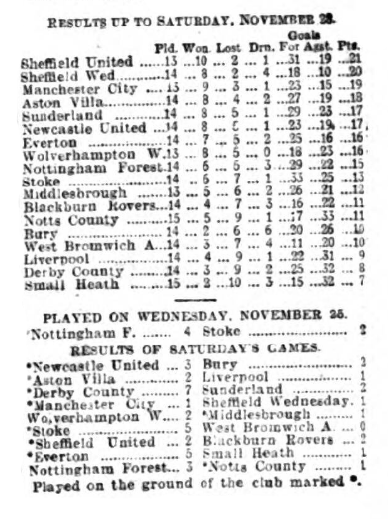
EVERTON REVIEW
November 30 1903. The Liverpool Mercury
To the great delight of their long suffering followers, of the Everton, scored in their fixture with Small Heath and thus to some extent credited themselves with a rather astonishing performance. The last occasion on which an Everton forward obtained a goal was October 17, when McDermott succeeded in beating the Bury custodian on the following Saturday, at Blackburn Wolstehome and Booth netted, since which a solitary point has accured, so that the five that were gained at the expense of the Midlanders in the game which under notice came in the nature of a mild surprise. There was two changes in the constitution of the Everton front rank, Hardman being given a rest after his arduous labours in connection with a recent examination, but McDermott was disposed for Taylor, and this change proved a decided success. About a quarter of an hour to the commencement the light became so bad, with the accompanying rain descending in torrents, that it appeared probable the match would have to be postponed. However the conditions improved before the players appeared, but the closing stages of the contest was carried in a gloom which almost hid the men from view. Fortunately for Everton, the issue had already been played outside the region of doubt; and there could be no mistaking the superiority of the home eleven in the second half. Before the interval there was little to choose between the contending teams, and although Everton led the way in scoring, through Sharp, who successfully negotiated a penalty kick the visitors equalised with a very pretty goal, by Leonard. The Heathens were rather unfortunate in having several creditable efforts, charged down but just as the limit of the first half reached Sharp forced a corner, and Abbott headed the second goal, and his first of the season. Afterwards there was only one team in the running, and the Heathens defence was subjected to severe pressure. Young was responsible for a third score, after Taylor had made a sorry attempt to perform a similar feat, and the Everton centre was decidedly luckily in being thereby placed favourably. After a series of attacks Taylor went past the backs but Robinson saved cleverly and dealt likewise with a terrific drive from Sharp. Small Heath only got away at rare intervals, though Kitchen had twice to exert himself fully to get rid of difficult shots from the right wing. Then Booth put on a fourth goal, and from a scrimmage, Taylor appeared to be responsible for a fifth. Though in the darkness it was almost impossible to distinguish the men. Thus Everton gained a decisive victory, which truth to tell, was only what they deserved, for taking the game throughout, they were vastly superior to their opportents in effective work. Chief credit for this one-sided success must be awarded to the Everton half-backs, who gave a really fine display all along the line. Booth has recently been seen to such great advantage as in this match and he repeatedly broke up the attempts at concerted movements by the Midlanders' front line. But all the members of the division kept, splendidly in touch with their forwards, placing the ball well ahead and to the position where it was likely to be of the greatest assistance. Everton's superiority was clearly manifest here and their excellent methods, fairly wore down the attacks of the visitors, who at the finish were a well-beaten team. The forwards showed more dash and determination than has been the case fore some weeks past, and Taylor's inclusion was a great success. The inside right gave Sharp some beautiful passes, and, as of yore, invariably brought out the speedy qualities of his partner by judicious placing. Young showed signs of improvement in the centre and the combination of Settle and Corrin was exceedingly effective. The former was in a pleasing vein. Giving the extreme winger every opportunity of getting clear away, and Corrin, utilised the chances he got very capably. His centre were always dangerous and outside left is undoubtedly his natural position in the forward line. In honours for his kicking was vigorous and he was rarely beaten by the opposing wing. Crelly played a good game, and Kitchen was never at fault, though owing to the efficient work of the men in front of him, he was rarely fully extended. His most difficult shot came near the finish when, evidently content with their big lead, and remaining players on the Everton side eased off somewhat. Small Heath were seen at their best, in the first half, and had the Everton defenders showed any signs of wavering, the Midlanders must have forged ahead during this period. Green and Athersmith were very clever on the right wing the former fairly revelling in works, while the outside players sprinted and centred with a dash and accuracy that were strongly reminiscent of his earlier days, with the Villa team. Jones was only a moderate centre, for Booth allowed him no latitude, and the left wing was erratic, Leonard and Field only decasionally exhibiting the form which had been anticipated from them. At Half-backs, Wigmore was always in the thick of the fray and led the way in many a dashing attack, but the wings had more than they could manage to keep in check, and frequently came off second best in their tussles with the home forward. Further behind, Wassell defended very stubbornly, at full back but Stokes was not so successful, and Roberts was often left to clearout the invaders. He saved splendidly from Taylor and Sharp, and despite the big score against him, kept a goal. He had no chance to stop the shots that beat him and saved other's that might have baffled a less-capable keeper. The complete falling away of the Heathens in the second half was no doubt, due to the vigour of their exertions prior to the interval, which left them afterwards, in a somewhat parlous state. Everton on the other hand, kept up the pace throughout and, under conditions like these, which prevailed throughout the afternoon, their work was such to demonstrated the complete fitness of each player.
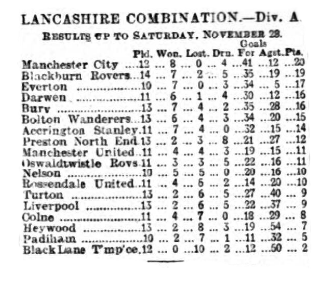
SMALL HEATH SWAMPED AT EVERTON.
Athletic News - Monday 30 November 1903
By Junius
Prior to the game with Small Heath, Everton had not scored a goal for five weeks, and it was therefore necessary that some club should suffer. Unfortunately the Midilanders, who were least able to stand such a strain, were the victims of Everton’s displeasure, and the home side gained their most decisive victory of the season by five goals to one. Hardman, who had been unsuccessful in his recent examination for the law, was given a rest, and McDermott was deposed, whilst on the visitors' side there was no change from that originally selected.
AN EVEN BEGINNING.
Just before the game started there was a tremendous downpour of rain, and darkness spread over the ground. This cleared, however, and under most depressing conditions the play was opened. The exchanges were very even prior to the interval, but Sharp scored from a penalty kick for hands, after twenty minutes. Small Heath replied vigorously, and from a centre by Beer, which followed clever work by Athersmith, Leonard equalised. The Midlanders were going very strongly at this juncture, and Kitchen was tested to the almost by Field, but close on half-time Sharp forced a corner and Abbott headed the second goal. This was the state of affairs at breathing time, but afterwards a great change was witnessed.
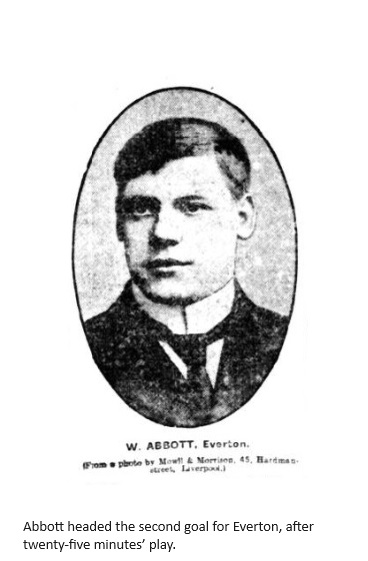
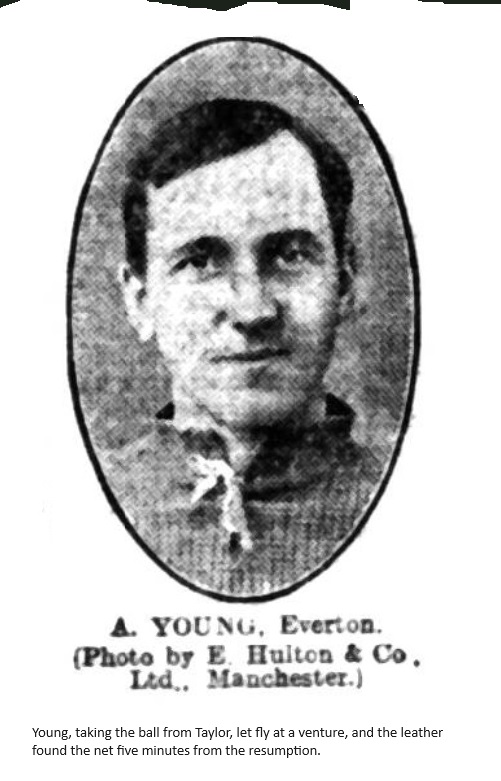
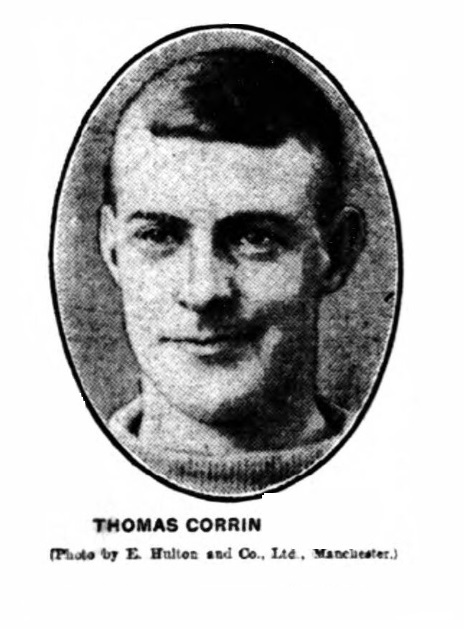
A ONE-SIDED SECOND HALF.
There was only one team in the running after the resumption. Corrin got nicely away, and centred to Taylor, who miskicked but the ball came Young, who cleverly added number three. A moment later Taylor dashed clean through, but Robinson saved beautifully on his knees when a score seemed certain. The custodian repeatedly cleared his lines, another shot from Sharp at close range being splendidly repelled. Everton were pressing continuously, and after strong attack Booth again netted, whilst from a scrimmage in the goal mouth Taylor apparently was responsible for a fifth. The Midlanders only broke away at rare intervals, bat their right wing was always dangerous, and Kitchen was twice compelled to throw clear difficult high shots from this part of the Heathens’ attack. Nothing further was obtained, and in the gathering gloom the final whistle blew.
EVERTON’S SUPERIORITY.
Everton undoubtedly showed to most advantage in their half-back division, and the really excellent work of this trio laid the way for the ultimate victory. Booth was particularly prominent, his tackling and placing being grand, and he was well backed up by Wolstenholme and Abbott, each of whom gave a display reminiscent of their finest form. These unceasingly worrying half-backs kept well in touch with their forwards, and were always placing the ball ahead to the best possible advantage, so that the members of the front line were afforded every opportunity of making headway. These latter were more effective than for some weeks past, and the inclusion of Taylor was a decided success. The inside right infused that dash into the forward movements which has been lacking in recent games, and he furnished Sharp with frequent openings, which the extreme winger scarcely utilized to the extent one could have desired. Young was fairly successful in the centre, and his goal was a clever effort, but the best combined work was witnessed on the left wing. Settle plied Corrin most judiciously, and the latter made the most of his chances. His centres were always dangerous, and there can be no mistaking his position in a forward line. At full-back Balmer played a splendid game, whilst Crelley only paled by comparison, and Kitchen was equal to all that came his way, though owing to the excellent work of the men in front of him he was seldom fully extended.
WEAKNESS OF THE “HEATHENS”
The visitors created a good impression by their clever work in the first half, but they must have over taxed themselves, for afterwards they could only make spasmodic attacks which seldom boded danger. Green and Athersmith indulged in some pretty combined play and were all through the most efficient part of the attack. Jones did not play badly in the centre, but the left wing was rarely in evidence, and lacked consistency. Wigmore was the pick of the half-backs, and the best part of the team was the rear division, for Wassell gave a capital display at right back and Robinson, despite the big score against him, made several beautiful clearances, when all his confreres had been completely beaten. No doubt the heavy nature of the ground affected the Midlanders, but otherwise it is difficult to account for their utter falling away after half-time, though it must be admitted that they could never get the upper hand of the Everton half-backs. Everton; Kitchen; Balmer and Crelley; Wolstenholme, Booth and Abbott; Sharp, Taylor, Young, Settle, and Corrin. Small heath; Robinson; Wassell, and Stokes; Beer, Wigmore and Howard; Athersmith, Green, Jones, Lenoard, and Field. Referee; H. Boldison, Stockton.
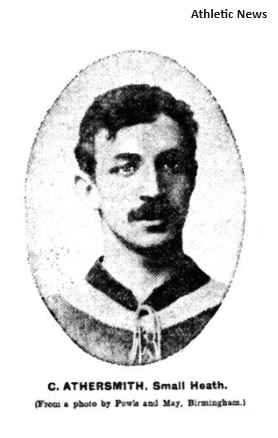
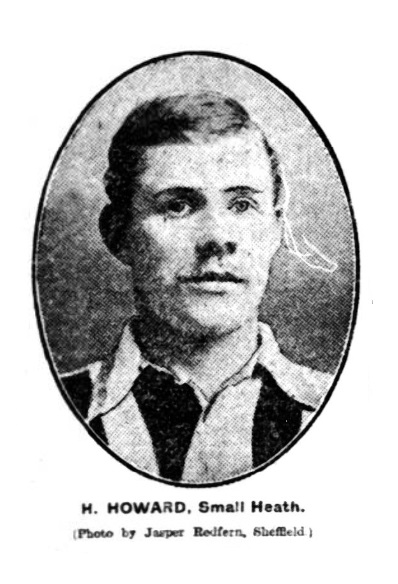
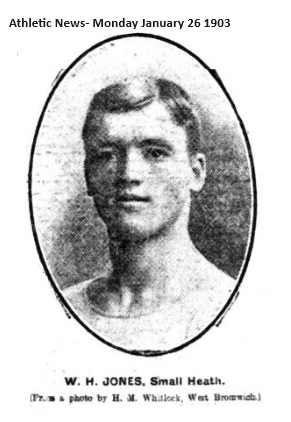
PROMINENT LIVERPOOL AMATEUR
Athletic News - Monday 30 November 1903
By Junius
One of the most promising of our amateur goalkeepers-and there are not many who aspire to first-class in this position –is Francis Albert Bushell, who holds the keeps for the Old Xaverians. He was born 21 years ago in Liverpool, and received his earlier education at the famous St. Francis Xaviers Colleague. He finished his career at the French Colleague, Blackrock, Dublin, and as at this latter place “soccer” football was tabooed, he had to study the Rugby game. In the first season he won his place in the Colleague Cup team, and his school won the School Challenge Cup which, it may be stated, was obtained eleven years in succession, and without doubt the school were one of the best Colleague teams in Ireland. Bushell played full back, and retained his place. After leaving colleague he played for the Old Xaverians, but went over to the Liverpool Caledonians for whom he did good service and this team won the Pyke Cup with a goal average of 13 goals to 1, for which feat Bushell holds a medal. On being invited to rejoin his old club he willingly did so, and has this season exhibited good form in goal. He is cool, resourceful, and fearless, and has all the makings of a capable goalkeeper. Equally clever with high and low shots, he has a penchant for saving penalty kicks. He stands 5ft 8ins, and weighs 10st. Last season he assisted Everton in three of their Combination matches, and I believe had the opportunity of playing with a Southern League club this season, but he decided to stay at home, and retain his amateur status. He does not confine himself to football, for he is an enthusiastic cyclist and a member of the 1st V.B. King’s Liverpool Regiment. He holds the unique position of Sergeant in Charge of the Cyclist Ambulance Section, which is, I am informed, the only one of its kind out of London.
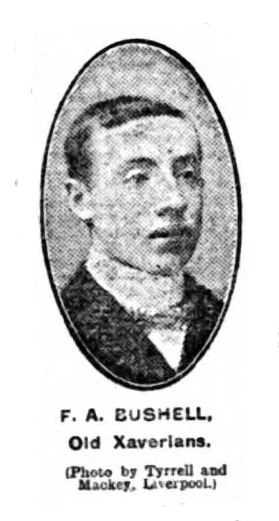
SMALL HEATH HEAVILY DEFEATED
Birmingham Daily Gazette - Monday 30 November 1903
Going up to the Everton ground on Saturday our thoughts turned to an experience which Small heath had in Liverpool a few years ago, when after having all the worst of the elements and holding their own, the game was abandoned after fifty minutes’ play. There did not appear any likelihood of even so much play as that taking place on Saturday, with the rain pouring down in torrents and the light so bad that all the electric cars and shops were lit up at two o’clock. Things took a turn for the better during the next half-hour, and though rain continued to fall and the light was far from brilliant, the match was proceeded with for the full ninety minutes. These people who had the hardihood to turn out- and I suppose there would be quite 10,000, for which Everton had to thank their extensive covered accommodation-had the satisfaction of witnessing a really fine display of football-a wonderful display one might say under the disadvantage of soft and slippery turf. Neither side could claim much superiority up to the interval. True, Everton were leading by a goal but the referee gave them the first with a very doubtful penalty, which was distinctly hard luck for the visitors, who did not deserve to be one down on the play. In the second half the form of the Everton men surprised their own supporters as much as anybody. For four matches they had not scored a goal; but the way they ran and passed and shot not only secured them three more goals, but completely nonplussed the Heathens, who got off well with a 5 to 1 defeat. Better football I have not seen from any club against the Heathens this season. Half-backs and forwards combined beautifully, the ball passing from man to man with striking rapidity and precision, and always towards the Small Heath goal. What a splendid example for the Small Heath forwards to copy! There was some attempt to open the game in the first half, hence the good show; but after crossing over the inside men fell into the same useless tactics of close passing and individual dribbling which has so often this season been the club’s undoing. Rarely did Kitchen have a difficult shot to stop, and the extreme men were given few chances to show their paces. Robinson was not to be blamed for the shots which scored. He saved many which looked certain goals. Stokes and Wigmore were the best of the other defenders, though a severe blow on the muscle of the arm affected the latter’s play. Athersmith played well at outside right, and Leonard, who scored the only goal with a fine shot, was a success at inside left so long as he opened out the game. The size of the Small Heath forwards was a big handicap against tall defenders. Everton were well represented at half-back by Booth, Abbott, and Wolstenholme, the old Small heath men playing a capital game. Of a fine row of forwards, Taylor and Sharp made the better wing. The backs were shaky at times, but Kitchen was safe in goal. Small Heath have now dropped into the last hole, and the prospects are not promising for getting out of it. Stoke will take a bit of beating next Saturday at Coventry Road.
EVERTON v SMALL HEATH
Liverpool Mercury - Monday 30 November 1903
It terribly wet weather, this match was played at Goodison Park, before 8,000 spectators. Small Heath had their strongest side, while Everton played Taylor and Corrin for McDermott and Hardman. Considering the adverse conditions, the game was contested at a great pace. Sharp converted a penalty against Stokes, and Leonard equalised with a capital shot. Abbott headed through for Everton from a corner. Half-time; Everton 2 Small Heath 1.
In the second half Everton had by far the best of the game, their forwards and half-backs playing brilliantly. Robinson kept a fine goal, but was beaten, first by Young and then by Booth. Afterwards Taylor added a fifth. Everton had all the play to the finish. Result- Everton 5 Small Heath 1
Everton;- Kitchen; Balmer, Crelly; Wolstenholme, Booth (Captain), Abbott; Sharp, Taylor, Young, Settle, Corrin.
Small Heath; Robinson; Wassell, Stokes; Beer, Wigmore, Howard; Athersmith, Green, Jones, Leonard, Field.
A ROUSING VICTORY
Liverpool Daily Post - Monday 30 November 1903
Sad would it have been indeed if Everton had failed to defeat such irreputable antagonists as Small Heath before their own crowd. During the first half of the game the Heathens made a very bold show, and deserved every credit for drawing equal after Everton had taken the taken the lead through the instrumentality of a penalty kick. The Small Heath forwards were not without merit, and much of their work was neat and effective. When adjacent to Kitchen they were, however, frequently timid and uncertain. Leonard and Athersmith initiated most of the attack for their side, and exhibited speed and clever footwork. Taylor partnered Sharp on the hoke right wing, whilst Corrin was moved to the extreme left. This rearrangement worked splendidly, and the quintet were ever on the move. The halves shaped very well all through, but though Everton seemed assured of victory at the interval they had not shown any very marked superiority, and the halves had not fully taken the measure of the Heathens’ front line. A surprise change occurred after the interval. The home halves went at it for all they were worth and Small Heath seemed to have neither reserve strength or resource to offer effective resistance. All of the Everton forwards seemed possessed of wonderful energy and the Heathens’ defence gave way under the strain of continuous attack. In the bad light Robinson did wonders in repelling scores of shots, but he had very little chance with those which found the net.
November 1903